International Rugby
SA Rugby is on the Rise
Resolution has triumphed over revolution and South African rugby’s resurrection is proving to be real in 2017.
It feels good watching the Springboks in 2017. It is even better to get to write about their performance and it is inspiring to report on the good news stories in South African rugby, from the Lions to the pending adventure of the Kings and Cheetahs in the Pro 14, to the return of Rassie Erasmus, and to the Springboks playing quality rugby to a packed stadium in South Africa.
In my Monday Business Day Newspaper column I wrote that just before you dismiss the Springboks’ 37-15 triumph against the Pumas in Port Elizabeth as ‘just being Argentina’, rewind the clock to 2016 and 2015 when the Springboks lost to Argentina (twice), lost to Japan (2015) and lost to Italy (2016).
The Springboks and South African rugby were a mess in 2016. Outside of the Lions in Super Rugby there was no joy in South African rugby.
Crowds were on the wane, pessimism was the only consistent and sponsors were running a mile from the Springboks.
The Springboks win in Port Elizabeth, in front of nearly 43 000 passionate South African rugby fans, gives substance to the reinvention of South African and Springbok rugby.
The leadership of South African rugby in 2016 was justifiably asked to front the mess. So too the Springbok coach and those players who wore the jersey through the darkest and most troubled times.
Mark Alexander, president of the South African Rugby Union, inherited a disaster from departed President Regan Hoskins. I was vocal in criticizing Alexander and Chief Executive Jurie Roux. I felt they were prominent only in their absence.
Why the silence? Where’s the solution?
Allister Coetzee, as coach, appeared out of his depth and the support staff and players selected produced results to support any view that they simply weren’t good enough.
Finally, Alexander and Roux started to speak publicly in 2017. They acknowledged the flaws in the system and the failures in South African rugby. They vowed to fix them. They spoke with calm and authority. They sought solutions and not knee-jerk reactions, and they were not swayed by public or media opinion.
At the time I wrote they should have been swayed by public opinion in getting rid of Coetzee, but they were of the belief that the coach had to be backed through greater investment in experienced support staff. They also created the position of National Teams (including the Springboks) Director of Rugby to lure back Rassie Erasmus, who had done wonders as the Head of Rugby at Munster, Ireland.
The appointment of Brendan Venter was huge in giving Coetzee a rugby soundboard and giving the Springbok management team one of the game’s best rugby tacticians.
Erasmus, like Venter, has always spoken firstly of being South African and wanting to make his best contribution to South African Rugby and the Springboks. He is expected back in a month’s time to take up his position.
Coetzee embraced every rugby decision. He remains the coach and the credit in four successive victories is his; just like the condemnation after losing to Italy was directed at him.
Take a moment to reflect on the good that is happening in our rugby and smile.
Heavyweight sponsors MTN and FNB have invested in the Springboks and the rugby public have also responded to the 2017 Springboks since the first up win against France in Pretoria.
It was a struggle to get 25 000 to Loftus in Pretoria for that opening Test and it needed a further win in Durban for the rugby public to believe again in Springbok rugby. A week later 55 000 made it to Emirates Airline Park for the third Test against France and the Nelson Mandela Bay in Port Elizabeth on Saturday was a handful shy of capacity.
The belief in South African rugby extended the Springboks. A Super Rugby record 63 000 filled Emirates Airline Park for the final against the Crusaders and nationally the country rallied behind the Lions.
South African rugby – on the field and in the boardroom – is on the rise.
The maturity of the game’s leadership to find resolution in the reduction of six to four South African Super Rugby teams has to be commended. South Africa’s leadership found an alternative that is ground breaking and offers commercial and sporting strength to the South African game with two teams playing in the Northern Hemisphere. Resolution has trumped revolution.
These are the most invigorating times in South African rugby since the on-field glory days of 2007 and 2009. Black and white players are the stars of this Springbok team and there is absolutely nothing grey in interpretation about the 2017 Springboks, who became the first Springbok team in 19 years and 234 Tests to beat a Tier One nation by more than 20 points in four successive Tests.
South African rugby is rampant again, significantly at a time when it is also bidding to host the 2023 Rugby World Cup and show the world why rugby remains a game akin to religion to the people of South Africa.
International Rugby
Brilliant Bordeaux bulldoze bewildered Bulls
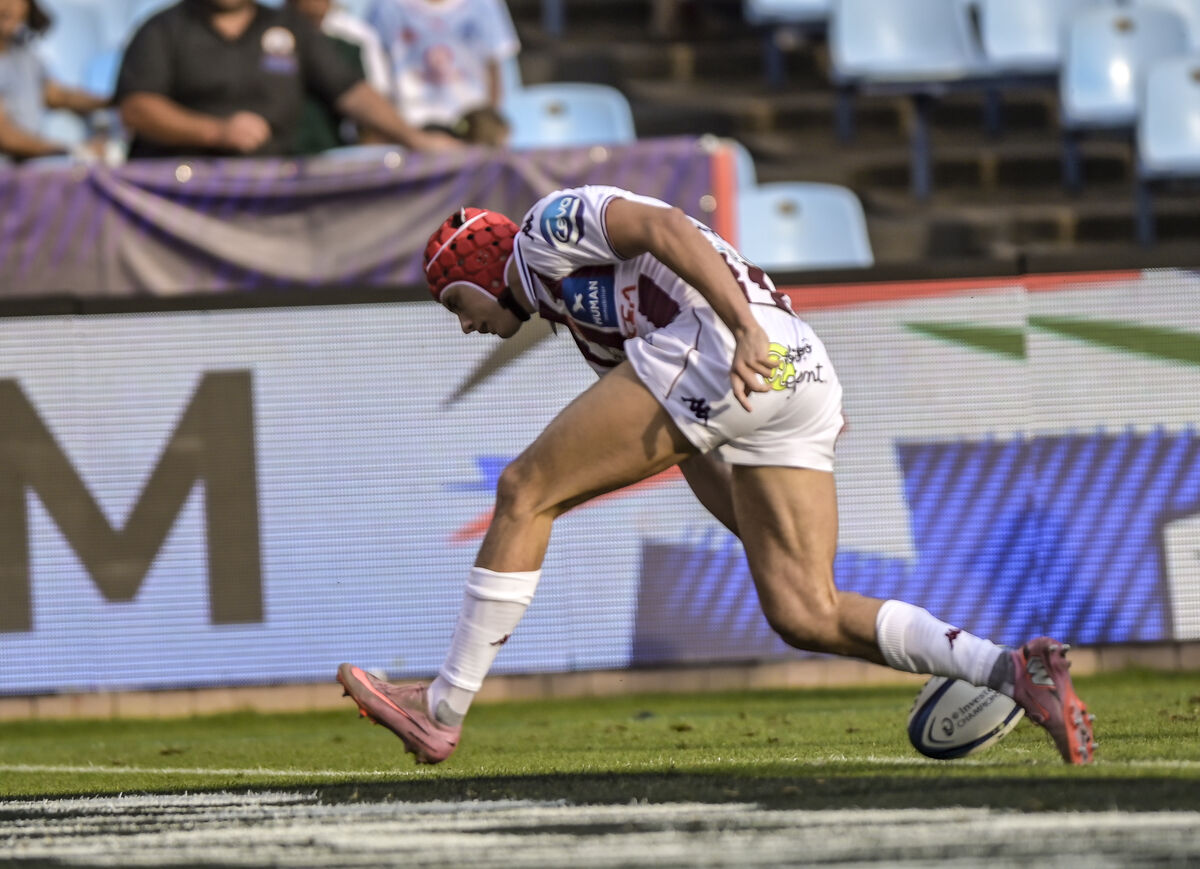
Bordeaux arrived at Loftus as reigning Investec Champions Cup winners and played like a side intent on keeping the crown. The French giants dismantled a disjointed Bulls outfit 46-33, producing a display that was composed, ruthless and dripping with international class, writes Mark Keohane.
And yes – the Bulls somehow led 33-22 at halftime.
The hosts scored five tries in 40 minutes yet never looked in control. The scoreboard offered false comfort and little else.
Bordeaux’s rhythm, tempo and accuracy suggested they were always the side dictating the contest, even when chasing the game.
Bordeaux travelled with 16 internationals in their match-day squad and their stars delivered. With Maxime Lucu and Matthieu Jalibert running the game like seasoned Test generals, and with Damian Penaud and Louis Bielle-Biarrey finishing with the brutality expected of world-class wings, the Pretoria crowd saw the gulf between elite European champions and a South African side still searching for cohesion.
It was breathless early on.
Bordeaux were seven points clear inside three minutes. The Bulls replied, faltered, struck back again, conceded again, and then surged with three late first-half tries. It looked dramatic on paper, but on the field the French were calmer, more accurate and operating with a clarity the Bulls could not match.
Jalibert toyed with the defence, his footwork and timing repeatedly opening space for a slick midfield. Bielle-Biarrey crossed twice, Penaud added to his outrageous tournament tally, and Bordeaux’s pack kept supplying clean, quick ball.
Once the second half kicked off, the Bulls vanished as an attacking threat. The champions tightened their grip, erased the deficit, and moved into a commanding lead with the kind of composure that wins knockout matches.
The Bulls had chances to claw it back to a single-score game, but their basics imploded. A crucial line-out was lost, the scrum wobbled, and the handling in the backline betrayed panic rather than purpose. Bordeaux, on the counter, could easily have added more.
This was a thorough reminder of what a title-winning squad looks like. Seven tries, four conversions and a penalty told the story.
Handré Pollard was solid early, kicked four from five, but a yellow card and two poor decisions shifted momentum the wrong way. De Klerk and Moodie worked tirelessly on the wings, and the loose trio put in the hard metres, but collectively the Bulls were outclassed.
And the biggest red flag: defence.
It hasn’t been good in the URC and it was worse here. Too many missed one-on-one tackles. Too little scramble. Too little structure. Bordeaux didn’t so much pick locks as walk through open doors.
With just 7,300 supporters turning up, the Bulls needed to deliver something worthy of their faithful. Instead, they teased with ten minutes of excellence and followed it with forty minutes of confusion and concession.
Bordeaux left Pretoria looking every bit a team chasing consecutive European titles. The Bulls left with more questions than answers, too few of them comforting.
Scorers
Bulls
Tries: Sebastian de Klerk, Reinhardt Ludwig, Akker van der Merwe, Canan Moodie, Jeandré Rudolph
Conversions: Handré Pollard (4)
Bordeaux
Tries: Damian Penaud, Louis Bielle-Biarrey (2), Maxime Lamothe, Boris Palu, Matthieu Jalibert, Salesi Rayasi
Conversions: Jalibert (3), Maxime Lucu
Penalty: Jalibert
BULLS – 15 Willie le Roux, 14 Canan Moodie, 13 David Kriel, 12 Harold Vorster, 11 Sebastian de Klerk, 10 Handré Pollard, 9 Paul de Wet, 8 Marcell Coetzee (c), 7 Reinhardt Ludwig, 6 Marco van Staden, 5 JF van Heerden, 4 Cobus Wiese, 3 Mornay Smith, 2 Akker van der Merwe, 1 Alulutho Tshakweni.
Bench: 16 Johann Grobbelaar, 17 Gerhard Steenekamp, 18 Wilco Louw, 19 Ruan Nortje, 20 Elrigh Louw, 21 Jeandré Rudolph, 22 Embrose Papier, 23 Stravino Jacobs.
BORDEAUX BÈGLES – 15 Romain Buros, 14 Damian Penaud, 13 Nicolas Depoortere, 12 Yoram Moefana, 11 Louis Bielle-Biarrey, 10 Matthieu Jalibert, 9 Maxime Lucu (c), 8 Temo Matiu, 7 Cameron Woki, 6 Bastien Vergnes-Taillefer, 5 Adam Coleman, 4 Boris Palu, 3 Carlü Sadie, 2 Maxime Lamothe, 1 Jefferson Poirot.
Bench: 16 Gaetan Barlot, 17 Matis Perchaud, 18 Ben Tameifuna, 19 Jonny Gray, 20 Tiaan Jacobs, 21 Arthur Retiere, 22 Rohan Janse van Rensburg, 23 Salesi Rayasi.
International Rugby
Super Stormers dream of Investec Champions Cup glory

John Dobson’s super Stormers are starting to dream of Investec Champions Cup glory after a stunning away win against Bayonne in France in the 2025/26 season’s opening round.
The Stormers won 26-17, despite being a player down for the final half hour.
Dobson was thrilled with the win, coming a week after a history-making first win the URC against Munster in Limerick, Ireland.
The Stormers, who are six from six in the URC, return to South Africa to play another French giant, La Rochelle next weekend. It won’t be in Cape Town as the DHL Stadium is not available and the match will be played at the Nelson Mandela Bay Stadium in Gqeberha.
Dobson mixed and matched for the Bayonne showdown, but pre-match insisted he had picked a match 23 good enough and talented enough to win against Bayonne, who had lost just once at home in the 2024/25 season in all competitions.
Dobson entrusted the talented 21 year-old scrum half Imad Khan to start and the former Bishops pupil and SA Schools star produced a Player of the Match performance. Loose-forward Paul de Villiers, the former SA under 20 captain, was against outstanding, having been the Player of the Match in Limerick a week ago.
WATCH: MATCH HIGHLIGHTS OF THE STORMERS WIN V BAYONNE
Several of the Stormers backs are not regular starting options, which makes the win that much more impressive, but Dobson said it was a credit to the depth within the squad that results like the one in Bayonne are possible without the likes of Springboks Damian Willemse, Sacha Feinberg-Mngomezulu, Cobus Reinach and Warrick Gelant, with the backline quartet not in action in Bayonne.
The Stormers made twelve line breaks to Bayonne’s two, but will lament not being more accurate in their finishing.
SA TEAMS CHASE THEIR FIRST STAR
Loose-forwards De Villiers (14 tackles), BJ Dixon (10) and Ruan Ackermann (7) were strong defensively and lock Connor Evans made 11 tackles. Dixon secured five line out takes, the most for the Stormers, and De Villiers’ all-round contribution was impressive, winning two turnovers, one offload, a line break, nine carries, and 21 metres on attack. He also beat four defenders, as did fullback Simelane.
Dixon (70 minutes), Ackermann (48) and Roos (42), were strong in their carries.
AFRICA PICKS: PICK THE STORMERS TO WIN
Clinton Swart, in his first start at flyhalf kicked two conversions and four penalties for 16 points, while fullback Wandisile Simelane made the most attacking metres (94).
The Stormers line out return was 100 percent.
Bayonne:
Tries: Mori, Erbinartagaray, Paulos
Con: Segonds
DHL Stormers:
Tries: Khan, De Villiers
Cons: Swart 2
Pens: Swart 4
DHL Stormers: 15 Wandisile Simelane, 14 Dylan Maart, 13 Jonathan Roche, 12 Dan du Plessis, 11 Leolin Zas, 10 Clinton Swart, 9 Imad Khan, 8 Ruan Ackermann, 7 Ben-Jason Dixon, 6 Paul de Villiers, 5 Connor Evans, 4 Salmaan Moerat (captain), 3 Neethling Fouché, 2 JJ Kotzé, 1 Ntuthuko Mchunu.
Replacements: 16 Lukhanyo Vokozela, 17 Ali Vermaak, 18 Sazi Sandi, 19 Adré Smith, 20 JD Schickerling, 21 Evan Roos, 22 Dewaldt Duvenage, 23 Ruhan Nel.
BREAKDOWN OF ALL STORMERS AND BAYONNE”S PLAYER AND TEAM STATISTICS
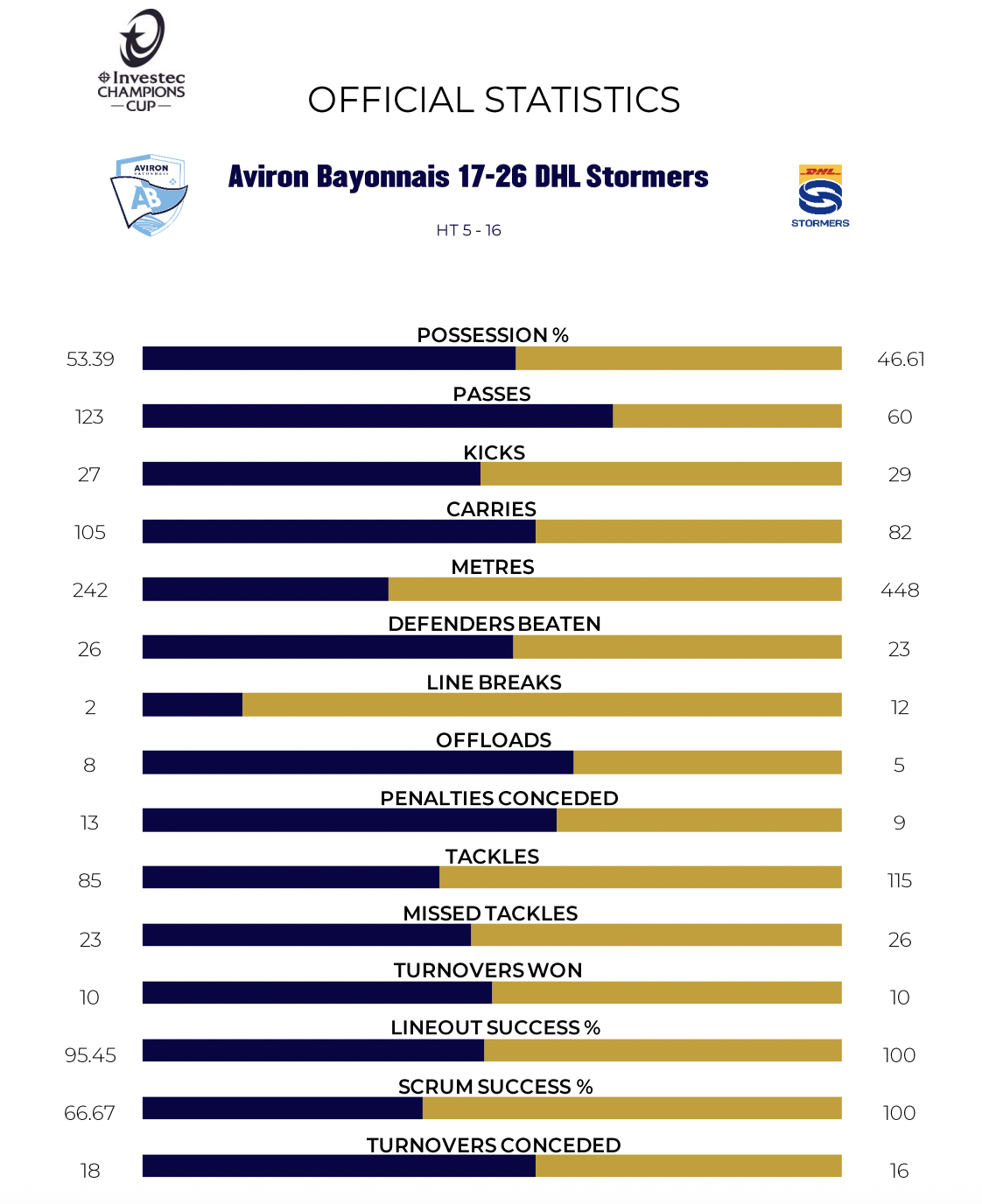
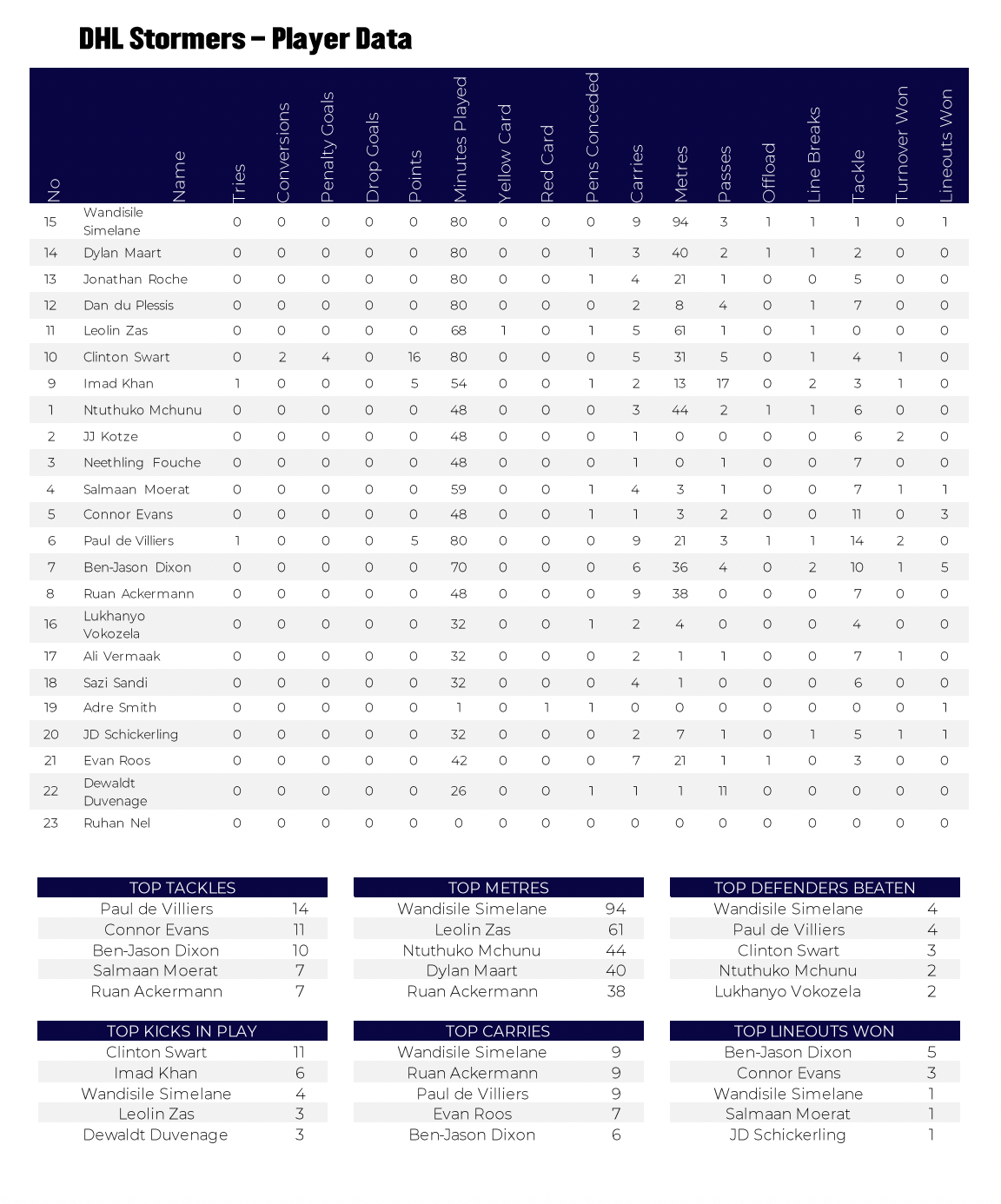
International Rugby
Investec Champions Cup: Bulls back their Boks to bully Bordeaux
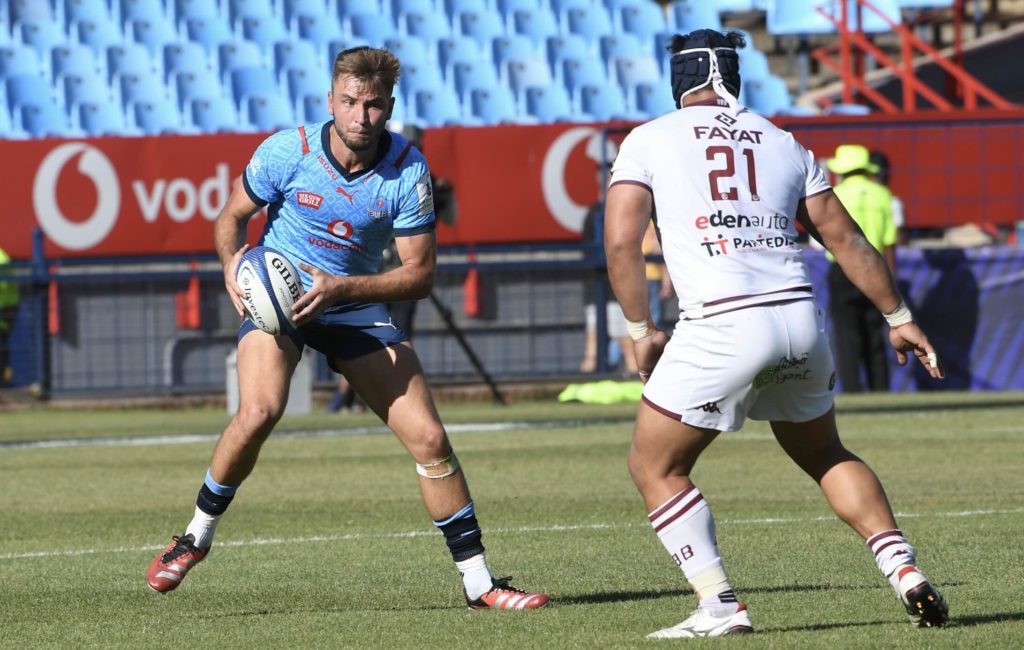
The Bulls are backing their Boks to bully champions Bordeaux of France in this weekend’s opening round of the Investec Champions Cup, writes Mark Keohane.
Every Bulls player on tour with the Springboks in November will be involved as the Bulls look to maker a statement performance against last season’s champions.
Bordeaux and the Bulls played each other at Loftus in the 2024 Pool Stages, with the Bulls winning a 12-try thriller 46-40. Both teams scored six tries two seasons ago and the difference ultimately proved two penalty kicks.
Handre Pollard, the king of kickers, returns to Loftus for his first start in the Champions Cup in the colours of the Bulls. Pollard’s previous Champions Cup history had been with French club Montpellier and English club Leicester.
Pollard will be significant to any Bulls challenge in the greatest club competition in the world, but it is the potency of a power bench that will be the determining factor in this match.
The starting front row from the Springboks 73-0 against Wales in Cardiff a week ago, are on the bench in Gerhard Steenekamp, Johann Grobbelaar and Wilco Louw. Ruan Nortje, the Boks form lock, is among the replacements, as are Elrigh Louw and Embrose Papier, who have played for the Springboks.
AFRICA PICKS: HOW TO CASH IN ON BULLS, SHARKS AND STORMERS
Louw will start his first match in a year after a lengthy spell out of the game because of injury.
Springboks flyer Canan Moodie links up with Springboks Test Centurion Willie le Roux in a back three complimented by the talents of winger Sebastian de Klerk and current Bok Marco van Staaden joins former Bok Marcelle Coetzee in the back row.
There are 13 Springboks in the match 23, with eight of them part of the Springboks 2025 squads. That includes Elrigh Louw, who was picked in the initial squads but did not play because of injury rehabilitation.
WATCH: KEO & ZELS ON THE BULLS, STORMERS AND SHARKS
The Stormers have also mixed and matched for their opening round at Bayonne, where the hosts only home defeat last season was to the Bulls in the Champions Cup.
Boks back superstars Sacha Feinberg-Mngomezulu, Damian Willemse and Cobus Reinach were not considered for the match, given their heavy workloads for the Stormers and Boks over the past two months, but Boks flanker BJ Dixon will play.
The Sharks, who play six-times champions Toulouse, are without several of their current Boks, but will still field a match 23 with international experience.
It is unlikely to be enough to prevent a one-side beating, given the Sharks struggles all season in the URC.
BORDEAUX BÈGLES – 15 Romain Buros, 14 Damian Penaud, 13 Nicolas Depoortere, 12 Yoram Moefana, 11 Louis Bielle-Biarrey, 10 Matthieu Jalibert, 9 Maxime Lucu (c), 8 Temo Matiu, 7 Cameron Woki, 6 Bastien Vergnes-Taillefer, 5 Adam Coleman, 4 Boris Palu, 3 Carlü Sadie, 2 Maxime Lamothe, 1 Jefferson Poirot.
Bench: 16 Gaetan Barlot, 17 Matis Perchaud, 18 Ben Tameifuna, 19 Jonny Gray, 20 Tiaan Jacobs, 21 Arthur Retiere, 22 Rohan Janse van Rensburg, 23 Salesi Rayasi.
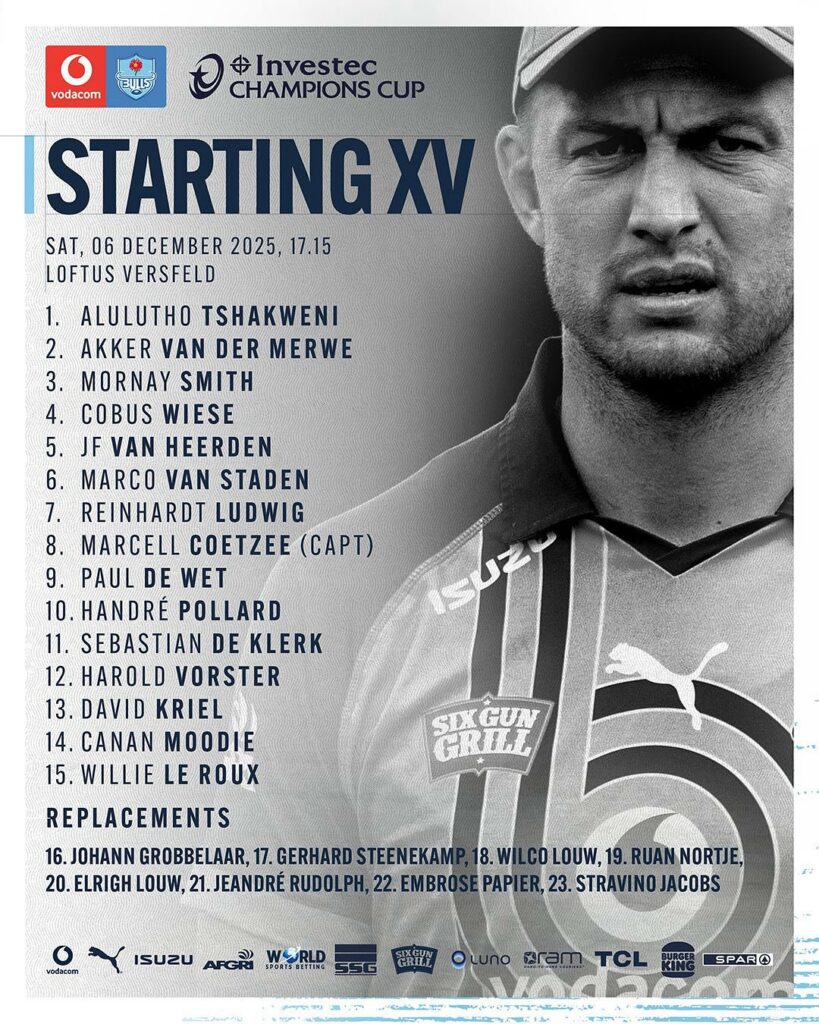
SOUTH AFRICA’S INVESTEC CHAMPIONS CUP TRIO CHASE THEIR FIRST STAR
International Rugby
Van Graan’s true impact at Munster revisited
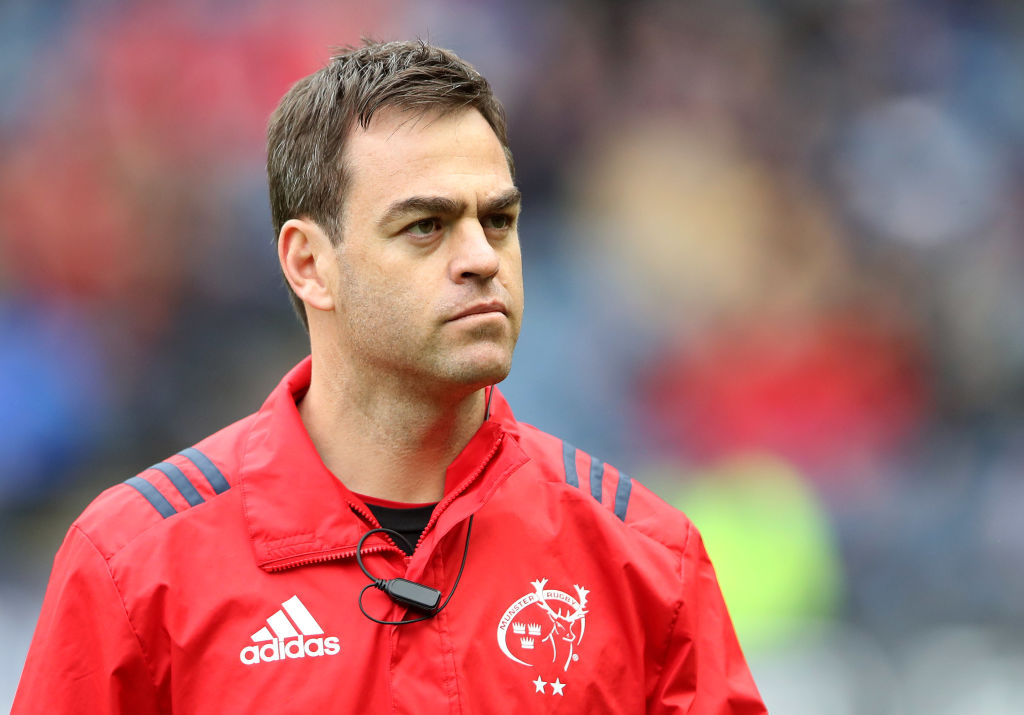
If ever there was a weekend to revisit Johann van Graan’s time at Munster then this is surely the one. And it could be that history is starting to pass more favourable judgement on his time there, and certainly of him as a coach. It should do.
As Bath host Munster in the Investec Champions Cup, in part this view is coloured by what van Graan has achieved at the Rec. On foot of leaving Munster in 2022, van Graan took over a side marooned at the foot of the English Premiership. Their rise since has been remarkable.
They ended that first season with a four-game winning run to finish eighth and qualify for the Champions Cup, where they reached the knockout stages for the first time in ages.
In his second season, Bath reached the Champions Cup knockout stages again and also finished second in the Premiership, only to lose the final to Northampton 25-21. Perhaps the biggest measure of the esteem in which he is held at Bath is that during that campaign van Graan signed a six-year extension up to 2029-30.
The club’s CEO Tarquin McDonald told TNT Sports: “We brought in an exceptional head coach and, really importantly, backed him. He’s a selfless leader. Genuinely it’s about team first and club first, and that’s so important.
“We extended Johann’s contract out to 2030 and the last time we went into a second cycle with a head coach was Jack Rowell, who was with us from ’78 to ’94; our first golden era as we like to call it, and, crazily, since then we’ve never been through a second cycle with a head coach.
“Where we are now, there’s continuity, which is absolutely vital for sporting success.”
The wisdom in that long-term extension was demonstrated last season, when Bath not only topped the table but hoovered up a treble of Premiership Cup (so ending a 17-year trophy drought), Challenge Cup and Premiership, which was their first league title in 29 years.
This is particularly ironic as the main source of criticism directed at can Graan is that his five seasons at Munster were trophyless. Yet, while Munster won the URC title under Graham Rowntree in 2022-23, is that too crude a yardstick?
Van Graan was derided for pointing to Munster’s 80 per cent winning record in his fifth season there. Yet it is true, and it has never been matched in Munster’s three completed seasons since. Indeed, Munster’s 67 per cent winning ratio overall in van Graan’s five seasons at Munster has dropped to 55.5 per cent in the three campaigns that followed.
Munster were also much more consistent, knocking on the door every season in both competitions. They reached three semi-finals and a final of what is now the URC before invariably running into the machine that was Leinster. In the Champions Cup, Munster also reached two semi-finals, a quarter-final and a round of 16. In the last three seasons they’ve had two last-16 exits and one quarter-final after that epic win in La Rochelle. That was their only knockout win in the Champions Cup since van Graan moved on.
His Wikipedia page says: “Van Graan’s Munster legacy is debated”. It adds: “While he took them to five semi-finals and a final, he never won a trophy. Some critics perceived his style as overly conservative.
“However, figures such as Simon Zebo have defended his record, describing Van Graan as a ‘master tactician’.”
Zebo told The Irish Times this week: “He goes into unbelievable detail. I would rate him very highly as a coach. He’s very good at finding little gaps or weaknesses in the opposition and he’s unbelievable at filling you with confidence and detail. He creates a very good environment. I enjoyed working with him and he’s a gentleman.”
Current players and coaches at Munster have said the same these past few weeks. In discussing his time at Munster, Tadhg Beirne told me, without being prompted: “I thought Johann was incredible when he was in there. I thought at times he got a hard rap for what he did, but in terms of the circumstances and what he was producing, it was very impressive.”
Beirne is not surprised by what van Graan has achieved at Bath.
“No, but if you look at his track record at Munster, he was getting us to semi-finals and finals all the time. I thought he was an unbelievable coach.
“I got on unbelievably well with him, and I thought he managed the group quite well. I thought he got the best out of a lot of players. I know, obviously, there’s going to be a lot of players who dislike him, because that’s like any coach, if you’re not playing, I suppose, as well, it’s easier not to like someone.
“I don’t know what the situation was in Munster at the time, but he probably wasn’t able to bring in the people he would have liked to have brought in. But what he achieved with us was still pretty impressive. It’s just you would have liked to have seen him have silverware on top of it, because I think he was deserving of it.”
John Hodnett was given his first Munster cap by van Graan, and admits his view is coloured by that.
“You always remember the coach that gave you your first cap, and he gave me my first cap. So yeah, I’d have good time for him. He’s a nice way about him. He’s a very nice man. He has a good plan in place. He gets good people in.”
Asked about van Graan’s legacy at Munster this week, Denis Leamy said: “Johann is a brilliant coach. He’s very highly rated. One thing that I’ve noticed here, you’ll never hear anyone say anything bad about Johann. He’s always spoken about in a really positive light.
“My own experiences with him have been nothing but insightful and he’s very generous with his knowledge. I worked with him here for maybe three months when I was working with the academy and I just thought he was a fountain of knowledge.
“It’s great to see him push on and achieve such great things with Bath over the last couple of years. They won three trophies last year, so fair play to him. It’s a great sign of his progression.”
International Rugby
South Africa’s top club trio chase their first Investec Champions Cup star
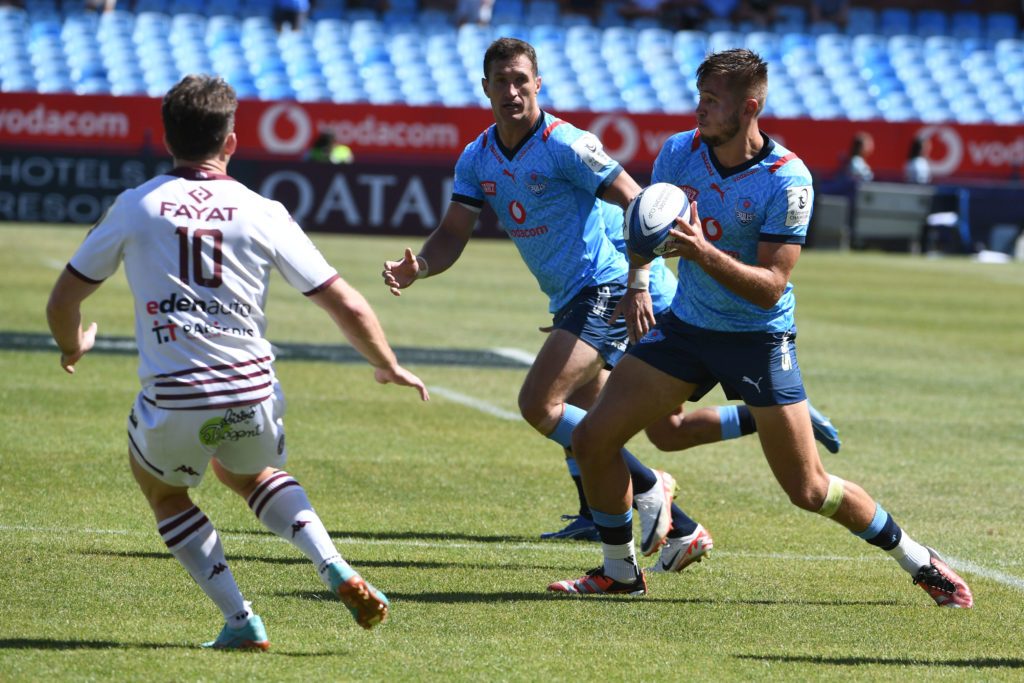
South Africa, at Test level, rules the rugby world, but in the Investec Champions Cup, the toughest club competition in the sport, the winning of the golden star has remained elusive for South Africa’s top club trio, writes Mark Keohane.
Toulouse, with six stars (titles), are the most successful club in the history of the Investec Champions Cup. Ireland’s Leinster have four stars and Toulon and Saracens have three each. For the rest, it has been a fight to get on the board and just 13 of the 40 clubs from Europe and South Africa have won the title.
It shows just how tough it is to succeed in the most battle hardened and complex knockout tournament in world rugby.
Saracens and England veteran Jamie George described the tournament as a World Cup knockout played over six months, with each match, from the opening league match, to the final, a knockout.
Home wins, in the league stages are non-negotiable, and wins on the road are as golden as the star the players are chasing.
Northampton’s Saints last season travelled to Pretoria and stunned the Bulls in the league stage, which proved crucial to their play-offs, where the English club won at the Aviva Stadium in Dublin against Leinster, before being edged 28-20 by France’s Bordeaux.
The defending champions are in South Africa to start the defence of their historic first ever Investec Champions Cup title. They play the Bulls at Loftus in Pretoria on Saturday, revisiting the scene of their dramatic 46-40 league defeat to the Bulls on the 20th January, 2024. It is the only time the two teams have met in the competition.
Both teams scored six tries in a 12-try thriller, with Bordeaux finishing the stronger.
Bordeaux, winners of the title in Dublin last season, beat their French rivals Toulouse in the semi-finals, but lost in the final of the Top 14.
The Bulls also lost in the final of last season’s United Rugby Championship, beaten by Leinster in Dublin, and both teams have had an indifferent start to their local competitions. The Bulls are three from six in the URC, having lost their last two matches, including a stunning home upset against the South African Lions last Saturday, while Bordeaux are also three from six in the Top 14, including successive defeats in the past fortnight, at home to Pau (33-34) and away to Montpellier (24-28).
The defending champions have a star-studded international squad with French flyhalf Matthieu Jalibert and flying wingers Louis Bielle-Biarrey and Damian Penaud among the best in the world.
South African prop Carlu Sadie is a regular in the Bordeaux set-up, as is the popular former All Blacks and current Tongan captain and 150 kilogram prime rugby beef Ben Tameifuna.
French scrum half Maxime Lucu is the general of a squad that includes a handful of imports from Australia and the Pacific Islands.
The Bulls, with 20 Springboks, past and present in their Champions Cup squad, will have their imposing Bok quartet of Gerhard Steenekamp (loosened prop), Johan Grobelaar (hooker), Wilco Louw (tighthead prop) and Ruan Nortje (lock), back for the tournament.
All four featured prominently in the Springboks five successive Tests wins in the Northern Hemisphere during November.
Springboks double World Cup winner Handre Pollard is another who will significantly improve the Bulls prospects of being the first South Africa team to wear an Investec Champions Cup star.
The struggling Sharks have the toughest of starts, away to Toulouse this weekend, while the in-form Stormers are in France to play Bayonne, who last season lost just once at home. That defeat was to the Bulls.
For all the latest EPCR Investec Champions Cup News
Follow the news on the Bulls, Sharks and Stormers
Investec Champions Cup fixtures (Round 1, SA times)
Friday, 5 December
Bayonne vs Stormers, 10pm
Sale Sharks vs Glasgow Warriors, 10pm
Saturday, 6 December
Saracens vs Clermont, 3pm
Bulls vs Bordeaux Begles, 5:15pm
La Rochelle vs Leicester Tigers, 7:30pm
Leinster vs Harlequins, 7:30pm
Scarlets vs Bristol Bears, 10pm
Bath vs Munster, 10pm
Sunday, 7 December
Pau vs Northampton Saints, 3pm
Toulouse vs Sharks, 5:15pm
Gloucester vs Castres, 5:15pm
Edinburgh vs Toulon, 7:30pm
International Rugby
World reaction: Boks turn Cardiff into a crime scene
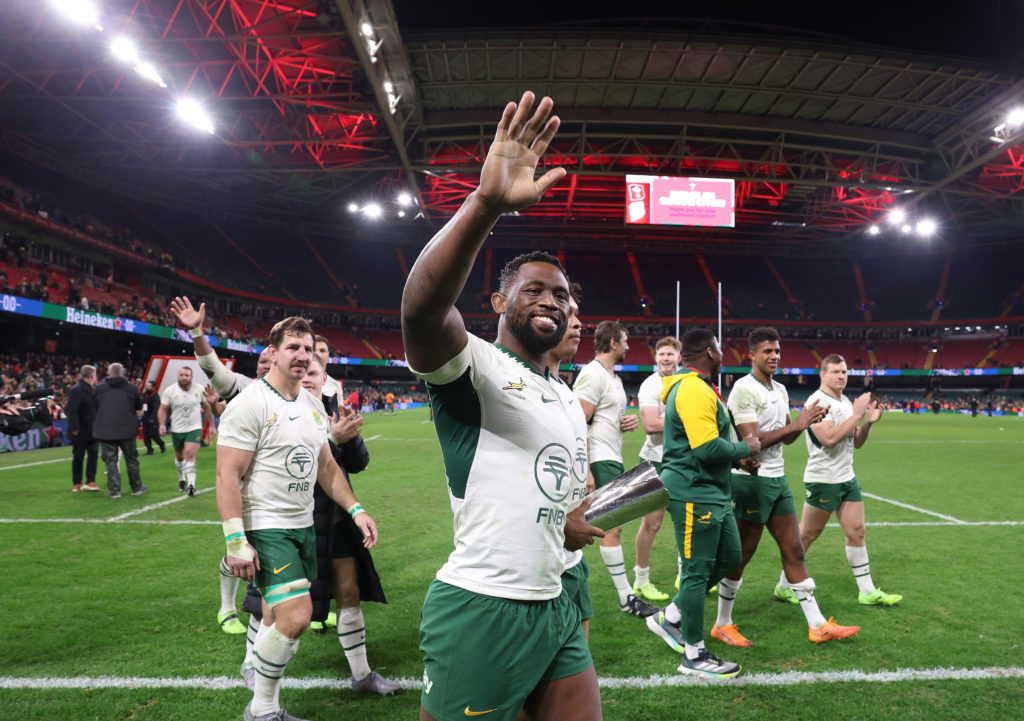
The global rugby press reaction to the Springboks 73-0 slaughter of Wales in Cardiff was split three ways: awe at the Boks, horror at Wales, and anger at the red-carded Eben Etzebeth.
The global rugby media didn’t so much report on South Africa’s 73–0 demolition of Wales as conduct a post-mortem.
Eleven tries, a clean sheet and a performance dripping with menace left the Welsh press stunned, the English papers grim, and the New Zealanders nodding with familiar respect. For the Springboks, it was another ruthless reminder of the standard they set.
For Wales, it was a national reckoning.
WalesOnline labelled it the “darkest day in Welsh rugby”, a humiliation years in the making. Their writers spoke of sadness and inevitability as a proud Test nation was “pulverised” in its own cathedral.
The Times questioned whether “men against boys” even captured the mismatch, praising South Africa’s precision while condemning Eben Etzebeth’s moment of madness as the only stain on an otherwise brutal masterclass.
The Sunday Telegraph called Wales “pointless” in every sense: a non-contest, a miscalculated fixture, and a record defeat that exposed the gulf in class.
The Rugby Paper described an “avoidable mismatch” that taught Wales nothing about their future and reinforced everything about South Africa’s relentlessness.
From a South African lens, the tone was clinical rather than triumphant.
SA Rugby Magazine, TimesLIVE and Keo.co.za all stressed that this was the full stop on an unbeaten tour and another data point in Rassie Erasmus’s expanding blueprint. Fringe players flourished, structure and brutality blended seamlessly, and the trademark refusal to concede even a consolation point in the 80th minute said more about this team’s identity than the scoreline.
Even in New Zealand, the reaction was clear: NZ Herald credited a “superpower doing superpower things” and noted that South Africa end the year not only as world champions, but as the sport’s pace-setters.
The world didn’t just witness a hiding. It witnessed a statement.
South Africa’s standards are non-negotiable. Their depth is frightening.
And Wales – under-strength, underpowered and overwhelmed.
KEO & ZELS – SIYA’S BOKS PURR WITH PERFECTION
WalesOnline – “Welsh team crumble in record home defeat”
WalesOnline’s match coverage framed this as the darkest day in Welsh rugby at the Principality: 11 unanswered tries, first time “nilled” at home in decades, and a scoreboard that felt like an execution rather than a contest. Their pieces stressed how under-strength Wales were, but made it clear that selection politics and WRU mismanagement created the circumstances for this humiliation. The tone mixed shock and resignation – the sense that this 73-0 was years in the making. Follow-up reaction columns spoke of “very real sadness” and a tragic unravelling of a proud Test nation in front of its own people. Flashscore+1
Welsh Sunday voice – Nation.Cymru / Welsh reaction
As a distinctly Welsh lens outside the big UK dailies, Nation.Cymru’s weekend take treated 73-0 as a national reckoning. The piece stressed that the result wasn’t just about missing Premiership-based players; it was about a structural decay in Welsh rugby – from pathway to finances – exposed brutally by the world champions. The article highlighted a fanbase oscillating between anger and apathy, a stadium with worrying gaps in the stands and a governing body “out of answers”. It argued that the scoreline must force WRU members to confront whether the current model can produce anything other than more days like this. The Independent+1
The Times / Sunday Times (London) – Steve James
In The Times (from the same London stable as the Sunday Times), Steve James called it “every bit as grim as feared”: a physical mismatch that made “men against boys” feel like understatement. He emphasised the Boks’ scrummage and aerial dominance, Sacha Feinberg-Mngomezulu’s 28-point masterclass and Wales’ inability to execute even basic set-piece chances. But his central theme was Etzebeth: the eye-gouge described as a “blatant act of thuggery” that soiled a magnificent team performance and will likely bring a long ban. For Wales, he portrayed a low ebb – empty seats, fragile confidence and shallow depth laid bare. The Times
Sunday Telegraph – James Corrigan
For The Sunday Telegraph, James Corrigan’s live report and follow-up hammered home one idea: “pointless Wales”. His copy stressed how uncompetitive the hosts were from the opening scrum, how quickly South Africa’s power game turned into a procession, and how little value the fixture offered anyone by the final quarter. Corrigan underlined that this was Wales’ worst home defeat and first Cardiff whitewash since the 1960s, and questioned the wisdom of scheduling such a mismatch outside the Test window. He also leaned into the Etzebeth incident, arguing that an 11-try rout did not need to be accompanied by such unnecessary nastiness. Telegraph+1
The Rugby Paper (UK) – weekend broadsheet
The Rugby Paper’s headline – “Steve Tandy’s pointless side put to shame in 11-try thrashing” – captured its harsh verdict. Their report stressed how this was a weakened Wales, stripped of Premiership-based players, but insisted that didn’t excuse the scale of collapse. The analysis described South Africa as operating in a different weight division, with their bench alone out-capping the entire Welsh match-day 23. The paper portrayed the game as a damaging non-contest that taught Wales nothing, eroded public faith and raised serious questions about WRU strategy. The Etzebeth red card was the grim coda to what they saw as a “needless mismatch”. Ground News+1
Planet Rugby – Winners & Losers
Planet Rugby’s “Wales v Springboks Winners & Losers” piece leaned into the contrast: Sacha Feinberg-Mngomezulu, Andre Esterhuizen and the Bok pack among the big winners; Eben Etzebeth and the sport’s image squarely in the losers column. They praised South Africa’s “floor-filling tunes” in attack – the variety of their strike plays and the fluency of a heavily rotated side – and highlighted Esterhuizen as the poster boy of Rassie’s hybrid revolution, this time unleashed as a classic ball-carrying 12. On Wales, the verdict was that an under-powered side were “out of their depth” and that 73-0 will haunt the WRU for years. Planet Rugby+1
Rugby365 – Warren Fortune & Leezil Hendricks
On Rugby365, Warren Fortune’s match report and Leezil Hendricks’ player ratings built a coherent picture: South Africa ended their Nations Series with a “73-0 command performance”, scoring 222 points across the tour and conceding just 51. The site stressed how thoroughly the Boks dominated the collisions and set piece, and how many so-called fringe players enhanced their 2027 World Cup credentials. Follow-up video pieces focused on Rassie Erasmus’ reaction to Etzebeth’s red – Erasmus admitting the card was justified and that “the optics weren’t great”. At the same time, Rugby365 emphasised how ruthlessly the Boks defended their line in the closing minutes to protect the nil. Rugby365+3Rugby365+3Rugby365+3
Keo.co.za – Mark Keohane
On Keo.co.za, your “Andre the Giant & his fellow Boks slay the Dragons” column framed 73-0 as the ultimate expression of Rassie’s “no let-up” mentality. You leaned into the symbolism of the Boks still fighting for a turnover in the 79th minute with the score already at 73-0, arguing that this spoke to the aura and internal standards of this group. The piece highlighted the dominance of the forwards, the impact of Esterhuizen in his new hybrid role, and the statement made by finishing an unbeaten tour with a record win. Etzebeth’s red was acknowledged, but the core theme was character and ruthlessness rather than controversy. KEO.co.za+2KEO.co.za+2
Sunday Times South Africa / TimesLIVE
Within the Sunday Times SA / TimesLIVE stable, coverage underlined the professional coldness of the Bok performance rather than the chaos of the scoreline. The Business Day/Sunday Times reports talked of a “clinical” and “commanding” demolition that completed a clean sweep on tour and cemented South Africa’s No 1 ranking. They emphasised how many combinations Rassie experimented with across Japan, France, Italy, Ireland and Wales, yet still produced an 80-minute performance in Cardiff. The Etzebeth incident was treated as an ugly, isolated flashpoint in an otherwise near-perfect collective exhibition from a side that “simply don’t do dead rubbers”. Business Day+2Sunday Times+2
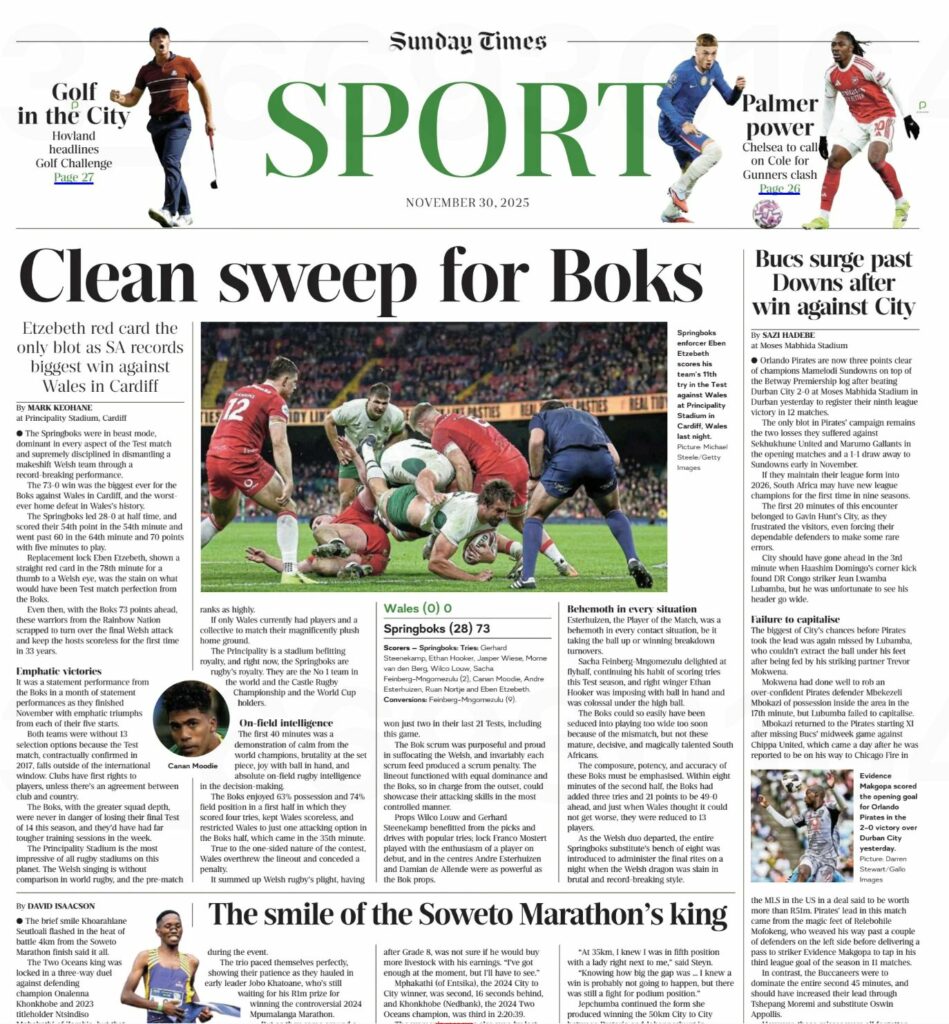
SA Rugby Magazine – Borchardt & co.
SA Rugbymag.co.za ran a suite of pieces: Simon Borchardt’s “Brilliant Boks demolish Dragons” match report, features on Rassie being “proud of hungry Boks”, Siya Kolisi hoping the red card wouldn’t overshadow things, and a big-picture “Springboks gaze down on rugby world”. The mag stressed that 73-0 was one more data point in a two-year stretch of dominance, not a freak outlier. They homed in on the hunger of fringe players, the work-rate in chasing the shut-out and the seamless integration of youngsters like Feinberg-Mngomezulu. The red card was acknowledged but framed as a disciplinary headache rather than a stain on the team. SA Rugby magazine+3SA Rugby magazine+3SA Rugby magazine+3
AFRICA PICKS: CASHING IN ON THE BOKS
NZ Herald – Kiwi view on a Bok juggernaut
The NZ Herald piece (“Springboks crush Wales 73-0 in historic test demolition”) was a wire-style report but with a clear Kiwi subtext: respect for a rival superpower doing superpower things. It highlighted Feinberg-Mngomezulu’s Llandovery College link and 28-point haul, noted that this surpassed England’s 68-14 as Wales’ worst home defeat, and pointed out it was the first time Wales had been held scoreless at home in the professional era. For New Zealand readers, the article placed the rout in the context of South Africa closing 2025 with 12 wins from 14 Tests, reinforcing the sense that the Boks remain the team to beat in world rugby. NZ Herald+1
Planet Rugby, RugbyPass & others
RugbyPass, Guardian live, ESPN, RTE and TNT Sports all reinforced the same themes: “men against boys”, a structural Welsh crisis, a Bok machine that finishes the year indisputably No 1, and a sour taste from Etzebeth’s red. Many pundits, notably Dan Biggar on TNT, questioned whether such mismatches should continue to be scheduled; others argued it showed exactly why South Africa are on a different tier to every northern-hemisphere side right now. TNT Sports+4The Guardian+4ESPN.com+4
*Compiled by Keo.co.za & ChatGPT (All references verified)
International Rugby
Saluting the remarkable Boks career of Cobus Reinach
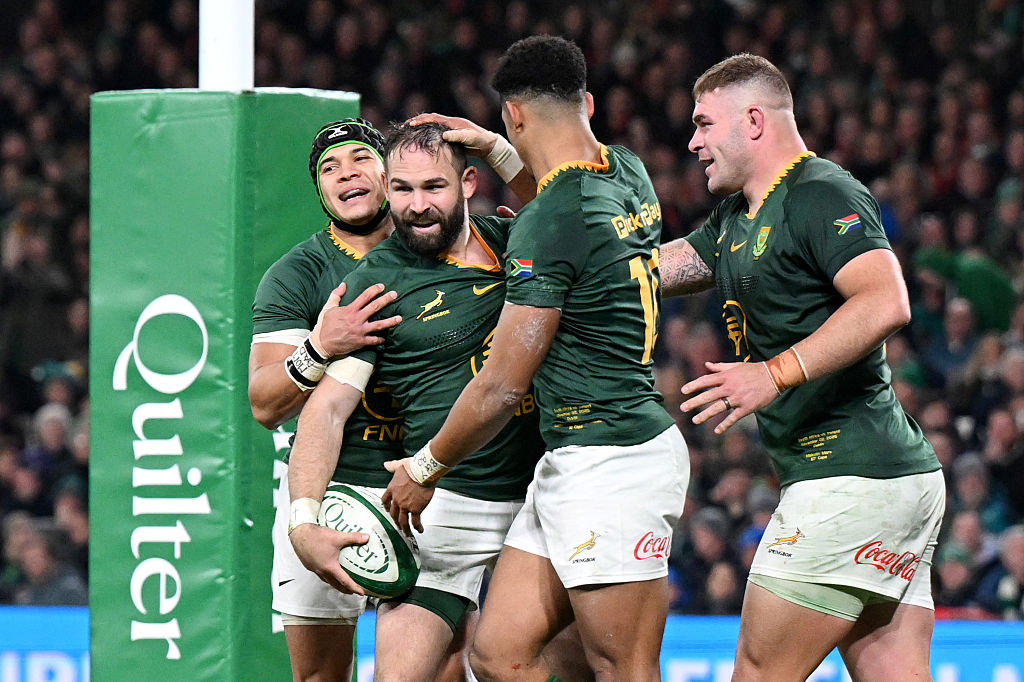
Springboks No 9 Cobus Reinach plays his 50 Test in Saturday’s season finale against Wales in Cardiff. It is a salute to a remarkable Test career, in which Reinach has shown that patience is a virtue and from patience comes the ultimate rewards, writes Mark Keohane.
I’ve covered enough Test rugby since 1992 to know that some players arrive like fireworks, bright and loud, and then disappear before the smoke has even cleared. And then there are players like Cobus Reinach, who is built on staying power, steel, speed, and a stubborn refusal to ever be counted out.
Reinach’s 50th Test comes 11 years after he debuted for the Boks at Newlands against Australia in 2014. He was 24 then. He is 35 now, and he looks quicker today than he did the afternoon he played his first Test.
That alone tells you everything about the athlete and the attitude.
But to salute Reinach purely as a survivor undersells him because he has thrived wherever he has played, be it in South Africa, England or France, at club level or for the Springboks.
He has done more than most scrumhalves who have ever worn the No 9 jersey for South Africa. Two World Cup titles and a hattrick in four minutes – the fastest in Rugby World Cup history – against Canada in 2019. He has scored 19 tries in 49 Tests.
And then there’s what he has done in the past month: two individual tries, each worthy of its own movie trailer. There was the crucial scorcher against France at the Stade de France in Paris that showcased his straight-line speed, and one as important against Ireland in Dublin, where again instinct and acceleration combined for five points.
Reinach has been electric throughout the Castle Rugby Championship and the November internationals, whether starting or closing out the Test.
Reinach, who made his Stormers debut a fortnight after being part of the Boks’ Rugby Championship title defence, played nine consecutive years overseas, at Northampton’s Saints for four years and then for the past five at Montpellier in France, where he finished on 103 matches. He played 76 for the Saints.
BOKS GO FOR THE KILL AGAINST WALES
He was never a case of ‘out of sight and out of mind’. He was always a part of the national equation under Erasmus and Jacques Nienaber.
Rassie Erasmus, speaking after the 2019 World Cup pool win over Canada, said: “Cobus is one of the best finishers in world rugby. His speed is one thing, but his attitude is what sets him apart. He never stops working.”
Jacques Nienaber has always maintained: “Cobus brings intensity. Whether he plays ten minutes or 80 minutes, he changes the game. That’s his gift.”
Montpellier’s Philippe Saint-André, upon his arrival at the French club, called Reinach “the fastest scrumhalf in the world – and the most professional player in the squad.”
Teammate Jesse Kriel, ahead of the 2023 World Cup playoffs, said: “Cobus doesn’t age. He trains like a 20-year-old and competes like a Springbok who knows the standard. We trust him with our lives.”
Even the great Aaron Smith, after the Boks beat the All Blacks in Auckland in 2014, commented privately (later repeated in interviews): “That No 9 is rapid. South Africa have something special there.”
WIN WITH THE BOKS & AFRICA PICKS
Everyone who has ever played with him or against him has said the same thing in different ways: Reinach is a game-breaker. You blink and he is gone. You hesitate and he burns you. You switch off and he is already under the posts.
For me, the beauty of Reinach’s Test career is that it hasn’t followed the script. It hasn’t been linear or predictable. He never became the “permanent” Bok No 9, but he became something far more valuable in being the player who can tilt a Test match at any moment, from anywhere on the field. He has been and is a player whose selection is never a gamble, because the return is almost always guaranteed.
KEO & ZELS TALK BOKS AND COBUS REINACH
He is the definition of a 23-man squad player in the modern era: dependable, devastating, disciplined.
Reinach’s route wasn’t easy and many within South Africa felt that he left the country when at the peak of his powers, but he continued to improve at the Saints and Montpellier.
His club mates speak of his lack of ego, his obsession with conditioning, his attention to video detail and his leadership and mentoring of newbies or less experienced players.
Saint-André once joked: “Cobus doesn’t drink wine. He doesn’t eat dessert. He eats speed.”
At 35, playing his 50th Test, he is still eating speed and burning international defences.
When I think of Reinach, I think of the Springboks’ identity under Erasmus and Nienaber, which is one rooted in readiness and not reputation.
There have been exceptional scrum halves playing for South Africa in the past 11 years, which is a statement on its own that Reinach gets to 50 appearances in Cardiff.
Cobus Reinach’s career is a lesson in perseverance, professionalism, and possibility, and a reminder to every wannabe Springboks scrum half in South Africa about consistency and relentless work ethic.
READ SA RUGBY MAG FOR ALL THE BOKS V WALES TEST PREVIEWS
International Rugby
Boks are back in Cardiff and going for the kill against Wales
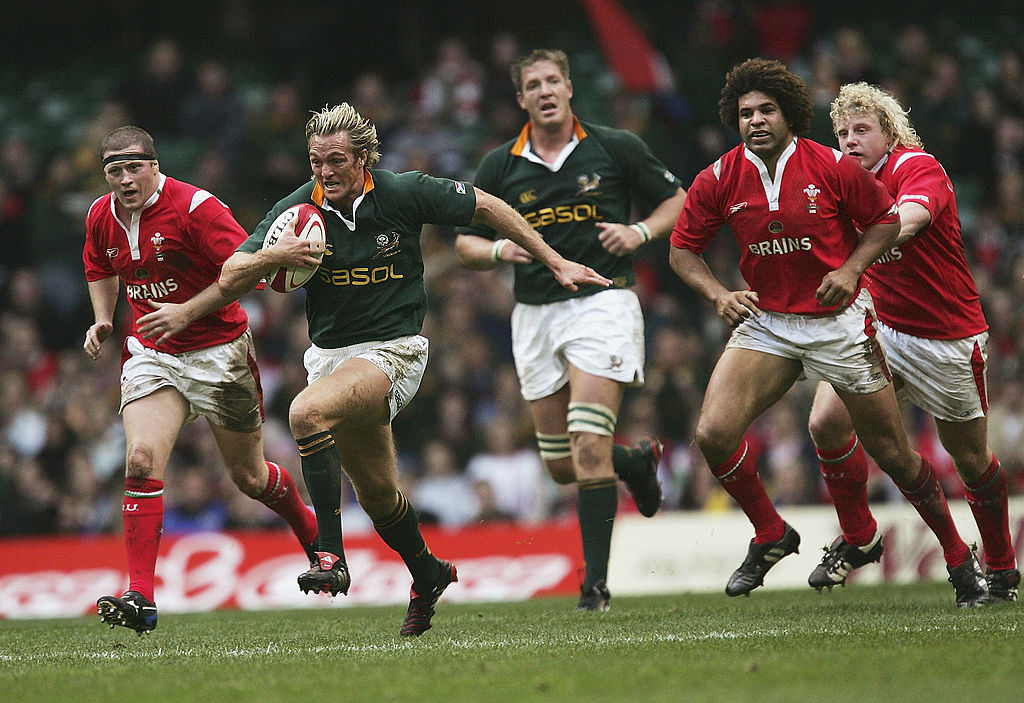
There will be no let off from Rassie Erasmus’s Springboks in their final Test of 2025 in Cardiff against Wales, and that is the attitude there should be from the sport’s best team, the official No 1 team for 2025 and the current World Cup holders, writes Mark Keohane.
Springboks coach Rassie Erasmus has shown Welsh rugby the utmost respect by picking his strongest available match 23 for a Test the Boks are expected to win with a record score.
Wales are without 13 of the players who fronted the All Blacks a week ago, and while the Boks are missing as many, there is no comparison in the quality of depth in both national camps.
Wales have won just two of their last 20 internationals, but there is a high regard within the Boks set-up, especially from Erasmus for what Welsh rugby represents.
There was a time, not long ago, that Wales was smashing the Boks, has been a consistent echoed by Erasmus this week.
In Erasmus’s first tenure as Bok coach, he won just seven from 14 Tests, losing to Wales in Washington DC in his first Test in charge and finishing the season beaten in Cardiff by Wales again.
There was the brutal 16-9 World Cup semi-final win in Japan in 2019, but what followed was a last minute win, via a Damian Willemse penalty at Loftus, a last minute defeat in Bloemfontein and then a tough 30-14 win in Cape Town to seal a 2-1 home series win.
In the past few seasons, it has settled more in Erasmus’s favour and Cardiff has become the happy hunting ground it was for Erasmus as a player.
Erasmus appreciates and recognises tradition and he knows just how passionate the Welsh are about their rugby.
They may be in a slump, but it was only eight years ago and Boks supporters were burning the Boks jersey and Wales were on a winning streak against the Springboks.
Erasmus has honoured the meaning of Test rugby with the strength of his selection, but also showcased how brilliantly he has integrated new squad players, post the 2023 World Cup, and managed the playing demands of veterans he is giving every chance to make it to Australia in 2027 for the challenge of an unprecedented third successive RWC title.
Carifff is a great city for Test rugby fans, none more than the Boks supporters, with so many making the trip down from London and various part of England, Scotland and Ireland.
The Principality Stadium is a rugby cathedral and magnificently impressive in terms of a spectator experience.
I was fortunate to report on the Boks win against Wales in 1996, which was the last time they played at the Cardiff Arms Park, before construction began for the building of the Millennium Stadium, which is now the Principality Stadium, right opposite the famous Angel Hotel, where again I was blessed to stay in the week the Springboks beat the All Blacks in the 1999 World Cup play-off for third place.
Breyton Paulse scored the only try of the play-off.
In my time covering the Springboks and being a part of the management, I have wonderful memories of great wins, even more impressive post-match experiences celebrating and a rich joy at the gift it is to write about and, having been part of, the Springboks.
The 1996 win was sweet and compelling. The Boks won 37-20 in what would be Andre Markgraaff’s last Test in charge.
The next time the Boks beat Wales away from home was at Wembley Stadium in 1998, as the Millennium Stadium had not been finished.
I missed the 1999 once-off visit to the Millennium Stadium when the Welsh stunned Nick Mallett’s Springboks. The Stadium was not yet complete, in terms of the stands, but the day is a historic one for Wales.
I was back with the Springboks under Harry Viljoen, working as Communications Manager, and the Boks won a difficult match 23-13 in 2000. We returned to Cardiff for the last match of the tour to beat a star studded Barbarians 41-31, and then did a Sunday all night season-ending party at the Walkabout in Mary Street. It was glorious.
There were wins for Jake White’s Boks in 2004, 38-36, in a match where Newport-based Percy Montgomery thrived and produced a Player of the Match performance. White’s Boks also won comfortably in 2005 and 2007 and Pieter de Villiers’s Boks enjoyed success in Cardiff in 2008 and 2010.
Heyneke Meyer continued the Boks success story in Cardiff in 2013, but in 2014 his Boks lost 12-6.
This started an unprecedented period of Welsh dominance over the Boks in Cardiff, with Bok coach Allister Coetzee’s team losing in 2016 and 2017.
Erasmus’s Boks lost 20-11 in 2018, but ever since then it has been all South Africa in Cardiff.
Frans Steyn, as a replacement, turned back the clock with a glorious kicking display to engineer a 23-18 escape for the Boks in 2021 and in 2023 Jacques Nienaber’s Boks, en-route to the World Cup, produced the biggest ever win for the Boks against Wales in Cardiff.
The Boks won 52-16 and completed their 2024 season with a 45-12 win.
KEO & ZELS: BOKS TO BURY WOEFUL WELSH
The bookies have given Wales a 38 point start, which means if you bet on them losing by under 38 points you are in the money and if you go with the Boks to win by more than 38 points, you are in the money.
WIN WITH AFRICA PICKS – BACK THE BOKS
If the Boks do win by 38 or more points, then it will represent another record for Erasmus and Siya Kolisi’s already record-breaking world champions.
It’s good to be back in Cardiff, after a decade of missing this match-up from the seats of the Principality’s Press Box.
The city is still humming and selfishly the Boks are the ones on a winning streak and favoured to make it five wins in succession against the Dragons.
READ SA RUGBY MAG FOR ALL BOKS V WALES TEST BUILD-UP
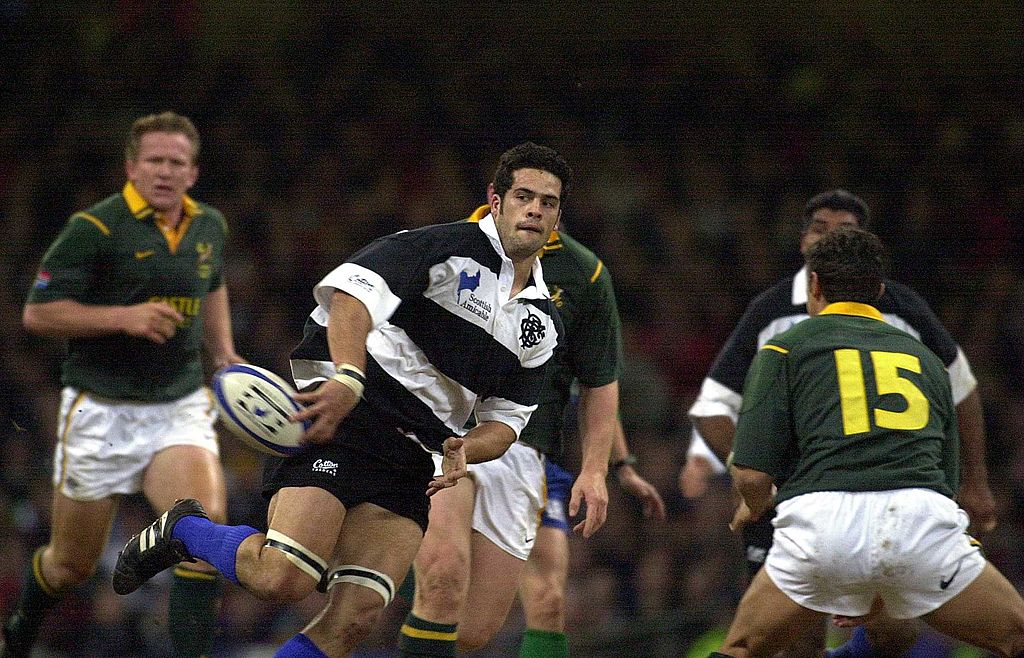
International Rugby
Boks scrum a STECO Power Play of brutal beauty
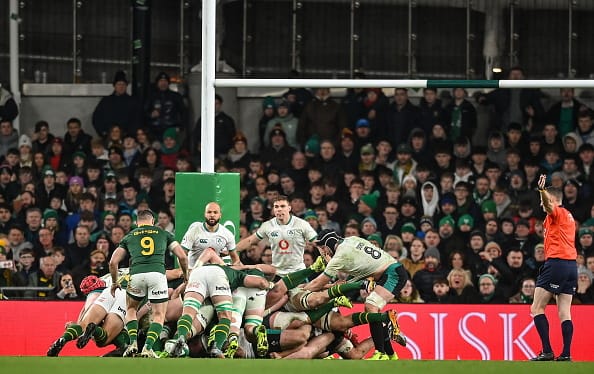
Keo & Zels were as emphatic as the Boks scrum against Ireland that the STECO Power Play was every time the Boks packed down to scrum Ireland into the Aviva turf in Dublin.
STECO is all about power, precision, sustainability and quality, and Keo & Zels, on their Rugby Podcast, said every member of the Boks pack combined to make the collective that much more powerful than any individual effort.
They acknowledge the individual try-scoring genius of Sacha Feinberg-Mngomezulu, the individual merits of Cobus Reinach, the relentlessness of Canan Moodie and the power of Damian de Allende.
But when it came to their weeks Springboks STECO Test moment, it was the Boks scrum that won the day, with the Boks feeding the scrum in 12 of the 16 scrums, and winning eight penalties on the 12 put ins. There were also more scrums on resets.
Ireland lost two players to yellow cards because of repeated scrum infringements and conceded a penalty try just before halftime to trail 19-7.
WORLD MEDIA REACTS TO POWER OF THE BOKS SCRUM
The general consensus, post the match, was that Ireland should have lost more players to the sin-bin for deliberate professional fouls at scrum time.
The Boks won 24-13; their first win at the Aviva Stadium during Rassie Erasmus’s eight years at the helm of the Springboks. It was also only the second time the Boks had played at the Aviva Stadium since Erasmus and Jacques Nienaber took charge of the Boks in 2018.
Ireland, who beat the Boks 13-8 in Pool Play at the 2023 Rugby World Cup in Paris, France, also beat the Boks 25-24 in Durban in 2024, a week after losing 27-20 to the hosts in Pretoria in the opening Test of the July internationals.
IRISH LOCK GETS SLAP ON WRIST FOR RED CARD OFFENCE
STECO IS GIVING YOU BACK YOUR POWER
The Powerful Bok scrum earns this week’s @STECO_Global #PowerPlay award! pic.twitter.com/5Cbpy9tHJt
SA Rugby magazine (@SARugbymag) November 25, 2025
International Rugby
Rugby’s world media reacts to Springboks win in Dublin

The world’s media lauded the dominance of the Springboks in Dublin against Ireland and were awed at the physicality of the world champions and No 1 team in the sport.
A summary of how the global rugby media reacted to the Springboks 24-13 win in Dublin.
The Boks scored four tries to one.
The Irish Times – Gerry Thornley
Thornley framed it as “the one that got away” for Ireland and a long-time-coming statement win for South Africa. He highlighted the Boks’ scrum dominance and physical edge, but also the surreal card chaos and inconsistency around Sacha Feinberg-Mngomezulu’s high shot versus the multiple Irish cards, leaving Ireland feeling hard done by while still acknowledging South Africa as clearly in control. The Irish Times
Irish Examiner – Simon Lewis
Lewis hit the same two big notes: Ireland’s “ill discipline” and the Springboks’ set-piece power. Ireland’s yellow-card avalanche and James Ryan’s 20-minute red created an unwinnable scenario against a pack as dominant as this Bok eight. He stressed that, even with 12 men, Ireland showed guts, but the champions were ruthless enough to end their Dublin drought. Irish Examiner
Sunday Independent (Ireland / Independent.ie cluster) – Edward Elliot & Indo Sport team
On the UK Independent (closely echoing the Indo line), Edward Elliot’s match report headlined the game as “cards, chaos and carnage” and said Ireland “paid a heavy price for ill-discipline” as South Africa ended a 13-year wait for an Aviva win. The coverage zeroed in on the five Irish cards, the decisive scrum penalty try, and Sacha’s solo effort that effectively killed the contest, while stressing that Ireland’s late fight only reduced the margin, not the gap. The Independent
On Independent.ie (Irish), the locked match piece – “Springboks’ scrum power proves unstoppable for Ireland after flurry of yellow cards” – is clearly framed around the same themes: scrum dominance, card carnage, and Boks in control. The Independent
Sunday Times (Ireland)
-
Boks physically and tactically superior at scrum time,
-
Ireland’s indiscipline fatal.
The Rugby Paper (UK) – John Fallon
Fallon’s match coverage in The Rugby Paper described a “scrum masterclass” from the Springboks and a self-inflicted implosion from Ireland. His tone was that of respect for Ireland’s resilience but little doubt about who was boss: the world champions used the set-piece to squeeze, strangle and finally break Ireland, leaving Farrell with more questions than answers two years out from 2027. The Rugby Paper
The Guardian – Brendan Fanning
Fanning’s Guardian match report ran under the headline “South Africa make heavy weather of victory over indisciplined Ireland”. He called it “a truly crazy event”, stressing how four Irish players were binned in the first half, Ryan’s card was upgraded to red, and the Boks only really converted their scrum supremacy when Ireland were down to 13. His core critique: a team this dominant at set piece should win far more comfortably – but they still reminded Ireland of the gap in power when it really mattered. The Guardian
The Telegraph (UK)
The Telegraph’s live coverage and write-up is trailed with the line that Ireland’s future questions “come to the boil” after a “plucky defeat” in which the scrum was “utterly dominant” in South Africa’s favour and Ireland were reduced to 12 men. From the available blurb, the angle is:
-
Ireland’s card-fuelled collapse at the set piece,
-
South Africa’s ruthless exploitation of that edge,
-
and the uncomfortable question of whether Ireland are slipping behind the Boks again in raw physicality and depth. The Telegraph+1
French Rugby & European Press
L’Équipe (France)
L’Équipe’s live commentary and report framed it as a “demonstration de force” by the double world champions, noting that after conquering Paris and Rome this November, the Boks had now imposed themselves in Dublin as well. They highlighted:
-
a monstrous scrum and maul,
-
Sacha Feinberg-Mngomezulu’s class with ball in hand,
-
and an Irish side that remained combative but simply couldn’t live with the Springboks’ power and pressure over 80. L’Équipe
Midi Olympique / Rugbyrama
Midol and Rugbyrama carried pieces and social posts casting the Boks as “seemingly invincible”, talking of South Africa “continuing their festival in the north” with another statement win. The tone is almost admiringly fatalistic: this Bok side, in French eyes, has turned Europe into its playground – Dublin now joining Paris and Marseille as venues where they impose their will.
New Zealand & Global
NZ Herald – AFP report
The Herald ran an AFP match report: South Africa’s first win in Dublin since 2012 after a 24–13 victory over an “ill-disciplined Ireland side that at one point was reduced to 12 men.” It underlined:
-
tries by Willemse, Reinach and Feinberg-Mngomezulu plus a penalty try,
-
Ireland’s courage in keeping the scoreline respectable,
-
and the personal milestone for Rassie Erasmus finally winning at Lansdowne Road, something he hadn’t done even as Munster coach. NZ Herald
South African Print & Online
Rapport – Louis de Villiers (Netwerk24)
De Villiers’ column “Bok-stutte wys hul spiere in Dublin-orgie van kaarte” (“Bok props flex their muscles in a Dublin orgy of cards”) sums up Rapport’s mood. He revels in the Bok front row’s destruction of Ireland’s scrum and embraces the madness of the yellow-card storm, effectively arguing:
-
chaos or not, this was a deeply satisfying, forward-dominated away win,
-
and a reminder that in the trenches, the Boks remain unmatched. Netwerk24
Sunday Times (South Africa) – Mark Keohane
In the Sunday Times, Mark Keohane’s column “Boks shake off Irish monkey” (as flagged in SA Rugby Mag’s wrap) celebrates the end of the Dublin hoodoo. His core beats:
-
Ireland were “brave”, but the Boks were “brutal”,
-
the scrum and collision dominance finally aligned with the scoreboard,
-
and Rassie’s world champions have reclaimed the psychological high ground in what’s now the sport’s premier rivalry. SA Rugby magazine
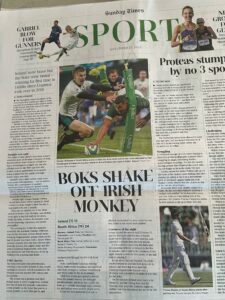

SA Rugby Magazine (sarugbymag.co.za)
SA Rugby Mag’s online coverage led with pieces like “Boks break Dublin deadlock” and “Boks crush ill-disciplined Ireland”, plus a deep-dive analysis referencing Keo’s pre-game call that the Boks would win by 11. The tone is unapologetically triumphant:
-
Dublin “belonged to the Boks” for the first time in 13 years,
-
Ireland’s aura at Lansdowne took a serious dent,
-
and the win validated Rassie’s decision to go full strength and target this fixture as the unofficial World Cup rematch that 2023 never gave them. SA Rugby magazine+1
Rugby365
Rugby365’s match report (and sidebar pieces) emphasised that the Springboks “ended their Dublin drought despite chaotic scenes” – focusing on:
-
the Boks’ dominance at scrum time and in the collisions,
-
the unprecedented five Irish cards to one South African,
-
and questions over Matthew Carley’s consistency, even while acknowledging that Ireland’s discipline invited trouble and the better team still won.
Planet Rugby
Planet Rugby’s early reaction came via their news and social channels: “Springboks too strong for ill-disciplined Ireland” and “five Irish cards in chaotic Dublin Test.” Their line is simple and punchy:
-
South Africa bullied Ireland at the set-piece,
-
ill-discipline wrecked any hope of a home win,
-
and the result re-asserts the Boks as the team to beat heading towards 2027. Planet Rugby
RugbyPass
RugbyPass ran player ratings and reaction pieces with the headline flavour of “Ireland player ratings after ruthless Springboks dismantle Andy Farrell’s men” and similar. The ratings hammered Ireland’s discipline and scrum, while giving big numbers to Malcolm Marx, Boan Venter, Eben Etzebeth and Sacha Feinberg-Mngomezulu. The key RugbyPass take:
-
this was a statement win from the Boks,
-
Ireland’s supposed set-piece improvements were “exposed” under real pressure,
-
and the contest showed there’s still a gap in depth and physicality between the sides. rugbypass.com
Keo.co.za – Mark Keohane
On Keo.co.za and its AfricaPicks crossover piece, Keohane doubled down after calling Boks by 11 in the build-up. His reaction article, effectively a victory lap, framed the win as:
-
Rassie’s Boks reasserting themselves as the sport’s true No 1,
-
Ireland’s Lansdowne aura being shattered in 80 ugly, beautiful minutes,
-
and confirmation that the rivalry is now tilted back towards South Africa, with Dublin no longer a graveyard but another green-and-gold hunting ground. SA Rugby magazine+1
Other Significant Angles
Several other outlets pushed similar themes that echo across your requested titles:
-
ESPN (Tom Hamilton): “Cards, chaos and a challenge answered” – Boks reminded Ireland of the gap in a bruising win, ending a 13-year wait in Dublin. ESPN.com+1
-
Daily Maverick (SA): “Springboks end Dublin drought against ill-disciplined Ireland” – very much in line with the Irish Examiner / ESPN story-arc. Daily Maverick
Quick Summary of the Global Mood
Across the spectrum – Irish, UK, French, Kiwi and South African:
-
Everyone agrees the game was utterly chaotic: a once-in-a-decade card-fest.
-
Irish writers strike a balance between feeling aggrieved at some decisions and admitting their side’s indiscipline and scrum issues cost them.
-
Neutral & global outlets (ESPN, AFP/NZ Herald, L’Équipe) frame it as a clear, deserved Bok win driven by set-piece domination, against an Ireland who never quite folded but were outgunned.
-
South African outlets are openly celebratory: the “Dublin curse” is gone, the rivalry is reset, and Rassie’s Boks have just walked into Ireland’s fortress and kicked the door down.
*Courtesy of ChatGPT 5.1 & all verified references
International Rugby
All Blacks, France & England win. What was said.
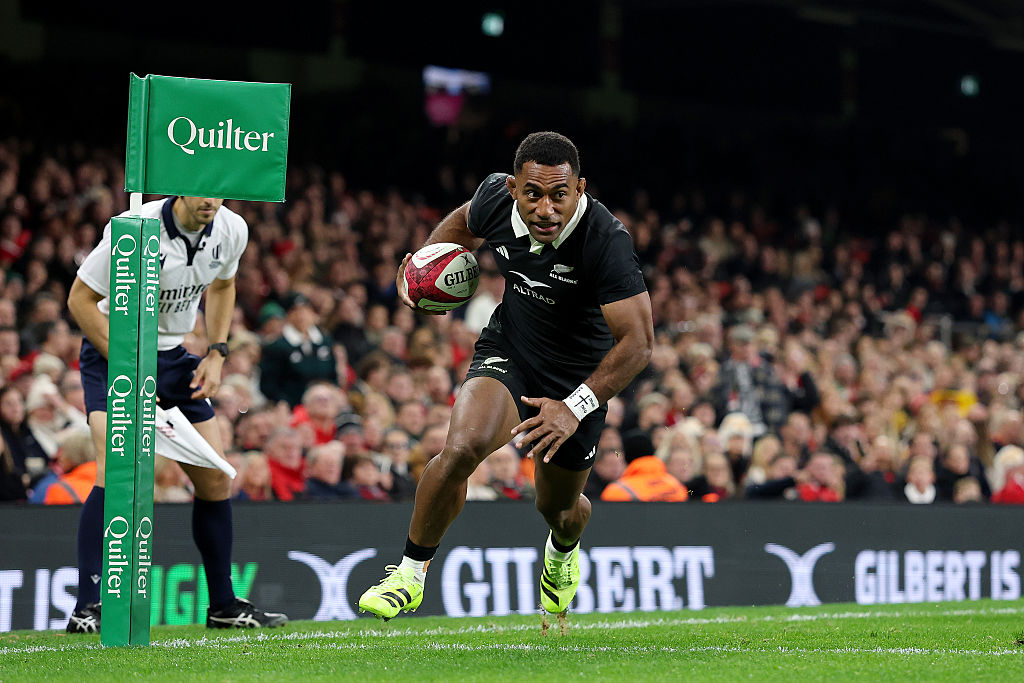
The All Blacks, France and England won the big three match-ups this weekend, outside of the heavyweight battle in Dublin between the Springboks and Ireland. The reaction was peculiar as France was roasted for scoring 48 points and Wales was complimented for only conceding 52. The rugby world has officially gone mad, writes Mark Keohane.
England are the next world champions, despite spending minutes 79 to 83 defending their line from defeat against Argentina, the Wales can only find positives in shipping 52 points and France were given a pounding for the way they played in scoring 48 points against the Wallabies.
Australia, for the first time in 70 years, could not win a match on their end of season tour, and, despite beating the British & Irish Lions in the third and final Test and shocking the Springboks with 38 unanswered points in a 38-22 win at Ellis Park in the opening match of the Castle Rugby Championship, they then won just two from their remaining 10 matches, beating the Pumas and beating Japan 19-15.
Their defeats were against the Springboks in Cape Town, the Pumas in Australia, the All Blacks, in Auckland and Perth, against England, Italy, Ireland and France.
Joe Schmidt’s two-year tenure ended with a 21 percent win record against the sport’s Top 10 ranked teams.
All Blacks 52–26 Wales, Cardiff
New Zealand
-
NZ Herald – Liam Napier
Napier called it a “late flourish” that eases pressure but doesn’t rewrite a turbulent All Blacks year. The 52–26 looks emphatic, but his piece stresses that beating an 11th-ranked Wales side with two wins in 22 is “no barometer of world dominance,” even if seven tries and a strong bench finish restored some polish to the season. NZ Herald -
1News (Patrick McKendry)
Framed as a response performance after the Grand Slam dream died against England. McKendry talks about the All Blacks “turning on a late flourish” in Cardiff, turning a tight contest into a blowout and highlighting the wing combination of Caleb Clarke and Sevu Reece as the difference once the game opened up. 1News -
Reuters
The wire leads on Tom Rogers becoming the first Welshman to score a hat-trick against New Zealand – “heroics in vain” – as the All Blacks still run away 52–26 and stretch their streak to 34 straight wins over Wales. It notes the two Welsh yellow cards as the turning point and underlines how Japan’s win in Tbilisi locks Wales into 11th for the World Cup draw. Reuters -
RugbyPass – Wales player ratings
RugbyPass is relatively kind on Wales: they “were very much in the match in the first half,” only trailing by three on 35 minutes, but physically overwhelmed when the All Blacks rolled their bench. Their line is that the scoreboard is ugly but there were genuine signs of life, with Rogers and Rees-Zammit getting strong write-ups. RugbyPass
UK & Welsh reaction
-
The Guardian – match report & live
The report (“Tom Rogers makes hat-trick history in vain…”) calls this a “spirited but ultimately unsuccessful” Welsh performance. Rogers’ hat-trick is framed as a symbol of a new, more ambitious Wales, but the piece is ruthless about the ill-discipline: two yellows in quick succession gave the All Blacks the space to run in three late tries and kill any notion of an upset. The Guardian+1 -
The Independent – Harry Latham-Coyle / Luke Baker
The Indy live says “a valiant Wales faded to a 52–26 defeat” and leans on the 72-year wait narrative – no win over New Zealand since 1953. They talk up the atmosphere, Rogers’ history-making hat-trick and another highlight-reel finish from Rees-Zammit, but ultimately file it under “encouraging but still a gulf in class.” The Independent -
Newstalk ZB / NZ Herald ‘World media reacts’
That round-up pulls in WalesOnline’s line that this was “the first time in a long while they offered some hope,” and the Daily Telegraph’s description of Wales as “rather heroic in this defeat,” while still conceding that seven decades of All Black dominance is the cold reality. The overall tone: moral victory in effort, brutal reality on the scoreboard. newstalkzb.co.nz -
Planet Rugby – 5 takeaways
Planet Rugby focuses on the All Blacks’ attack finally clicking, but labels one “dismal” facet – their defence still leaking soft points – as a concern heading into 2026, even on a night when they scored seven tries. Planet Rugby
Bottom line:
NZ media see it as a necessary but limited corrective to a messy year; Welsh and English writers talk about “hope” and “heroics in defeat” but everything is framed against the brutal 34-match losing streak.
France 48–33 Australia, Paris
French & neutral
-
Reuters
The wire sets it up as a high-tempo, chaotic Test where France’s attacking quality and bench power finally broke Australia in the last 20. Six French tries, Thomas Ramos running the show with boot and ball, but plenty of mention of French “indiscipline and defensive lapses” that kept the Wallabies in touch. Reuters -
RugbyPass – France player ratings
RugbyPass calls the second-half a “joy to behold” and says the 48–33 win gives Fabien Galthié “breathing space heading into the new year.” It notes this is a third straight win over the Wallabies, with the backline – Depoortere, Bielle-Biarrey, Ramos – getting the big scores in their ratings. RugbyPass -
SuperSport
SuperSport describe it as a “lacklustre 48–33 win” that closes a “turgid” French autumn and quickly pivots to the return of Antoine Dupont and defending the Six Nations. The theme is: result good, performance still short of 2022–23 heights. SuperSport
Australian & Southern Hemisphere reaction
-
The Australian
Brutal. They call it “the worst European tour since 1958” and underline the milestone: a winless four-Test tour and a record 10 Test defeats in a calendar year. The piece laments the same recurring issues – discipline, lineout failures, late-game fatigue – while acknowledging bright sparks like Max Jorgensen and Fraser McReight. The Australian -
Rugby.com.au (Nathan Williamson)
The official site tries to find the silver lining: “much-improved Wallabies fight but fall.” The attack structure and tempo under Joe Schmidt get praise, and there’s a sense that the 48–33 loss shows growth compared to earlier hidings… but the last-quarter fade, defensive lapses and basics still draw criticism. Rugby.com.au -
ABC News
ABC goes heavy on the history – “historic Test loss” and “unwanted record” dominate the copy. The 10th defeat of 2025 and the first winless European tour in 67 years are presented as a line in the sand moment for Rugby Australia. ABC -
Rugby365 (via AAP)
Rugby365 carry a wire piece headlined around “apologetic Wallabies.” Harry Wilson’s post-match apology to fans and insistence they will “be better” becomes the emotional hook, with the site framing it as a crestfallen but united squad at the end of a brutal 22-week, 15-Test slog. Rugby365
Bottom line:
France: relieved, talking about flair and depth but still concerned about discipline.
Australia: almost uniformly grim – lots of “effort” talk, but everything is filtered through record defeats, a winless tour and what it means for 2027.
Japan 25–23 Georgia, Tbilisi (last-minute win)
News wires & mainstream
-
Reuters (carried by The Star, Straits Times, others)
Reuters sets the scene: Georgia ahead late, then “ill-discipline let the Georgians down in the final minute” as Lee Seung-sin nails a last-kick penalty for a 25–23 win. The key angle is the World Rugby rankings shake-up – Japan up to 12th, Georgia down to 13th, and the result locking Japan and Wales into the second seeding band for the World Cup draw. Reuters+2The Star+2 -
The Star (Malaysia)
Runs the Reuters copy with extra emphasis on Georgia’s late penalty concession and Japan’s composure under pressure, calling Lee’s kick “a nerve-shredding winner” and framing the result as bigger for rankings than for the match itself. The Star
Rugby punditry & opinion
-
RugbyPass – “Eddie Jones’ Japan raid fortress for vital win”
RugbyPass goes much more tactical: Georgia’s early control through Tedo Abzhandadze off the tee, then Japan’s response via Dylan Riley’s try and 11 points from Lee before the chaotic finale. The narrative is “vital win” in a hostile Tbilisi, but also that Japan made it harder than it needed to be. RugbyPass -
AllThingsRugby – opinion
That piece is almost grumpy in tone: “even a win… can’t wash over disappointing 2025 for the Brave Blossoms.” It notes Japan’s healthy 5–2 head-to-head over Georgia, argues that slipping behind them in the rankings earlier in the year was the real red flag, and suggests this escape shouldn’t distract from a flat season overall. All Things Rugby | Rugby Union -
Social media / rankings chatter
Rugby analysts on X frame it as a huge rankings swing – “big result for Japan in Tbilisi” and specifically credit Seungsin Lee’s last-minute penalty for flipping Japan and Georgia on the ladder. X (formerly Twitter)
Bottom line:
Global wires treat it as a big rankings story and a World Cup draw subplot; rugby nerds see it as papering over cracks in Eddie’s Japan while cruelly punishing Georgian ill-discipline at home.
Scotland 56–0 Tonga, Edinburgh
Scottish & international media
-
The Scottish Sun
The Sun goes for the scoreboard: “Scots score EIGHT tries” to end a “tricky year.” They hammer Tonga’s discipline – four cards including a 20-minute red – and celebrate Duhan van der Merwe becoming Scotland’s all-time leading try-scorer. But even in a 56–0, they talk about “a lull” and inconsistency, and flag questions over Gregor Townsend’s future. The Scottish Sun -
ESPN
ESPN echo the big themes: eight tries, Tonga “ill-disciplined”, van der Merwe back ahead of Darcy Graham in the try charts, and the game as a much-needed mood shift after a “disappointing autumn” that included blowing a 21–0 lead to Argentina. ESPN.com -
SuperSport
SuperSport call it a “56-0 hammering” and emphasize Scotland rounding off the series by finally cashing in on their attacking structure. The angle is less on crisis and more on Scotland restoring some credibility after narrow and painful losses earlier in November. SuperSport -
RugbyPass – player ratings
RugbyPass say Tonga “presented them a golden opportunity” to right the wrongs of that dire Argentina loss – and Scotland took it. Their ratings praise the physicality and tempo, with big marks for van der Merwe, Ashman and Horne, while noting that Scotland were “wasteful” during one long scoreless period despite the numerical advantage. RugbyPass
Player & camp reaction
-
The Offside Line – Sione Tuipulotu interview
Tuipulotu refuses to get carried away: he talks about “doing the talking on the pitch” rather than promising the world, and acknowledges that a 56–0 over Tonga doesn’t erase the frustration of the autumn. Rugby News from The Offside Line -
RugbyPass – Tuipulotu quoted again
In a separate piece he’s even more blunt: “I’ll be honest” – he calls the series “frustrating” and says Scotland aren’t close to where they want to be, even with a big win and a record-breaking winger. RugbyPass
Bottom line:
Scoreboard says rout, and everyone notes Tonga’s discipline meltdown and Duhan’s record. Scottish voices, though, are almost defensive – this was a necessary reset, not proof that deeper issues are fixed.
England 27–23 Argentina, Twickenham (frantic finale)
English press
-
The Times – live/Will Kelleher
The Times’ live report paints it as a near-shambles turned salvage job. England race 17–0 ahead on Max Ojomoh’s home-debut brilliance and an Immanuel Feyi-Waboso finish, but then “invite pressure” with missed kicks, a clunky attack and discipline issues. Argentina storm back to 23–20 before Henry Slade’s try and a late George Ford penalty cling on for 27–23. The line is: unbeaten autumn intact, but attacking fluency and reliance on Ford’s boot remain concerns. The Times -
The Guardian – live blog/report
Similar story in the Guardian: “England edged out Argentina 27–23” after conceding 20 unanswered points. They praise Ojomoh’s composure and Itoje’s defensive work, but note that England’s attack went into its shell once the initial strikes landed. The frantic finish – Argentina line-out inside the 22 in added time, fluffed – is described as a reminder that England are still learning how to close out big games. The Guardian -
The Times – preview ‘This is England’s World Cup final – don’t mess it up’
The pre-match column framed this fixture as a psychological “final” after beating the All Blacks. The message: avoid the 2019 trap of emotional peak then post-All Blacks drop-off. In that context, today’s narrow win will be filed as job done, but only just. The Times -
The Guardian – Robert Kitson, ‘Beating Pumas could open pivotal chapter…’
Kitson’s preview is all about 2027: he draws a line back to England v Argentina in 2000 as the seed of the 2003 champions, and suggests this Pumas clash could play a similar role. He notes Argentina’s recent scalps (All Blacks, B&I Lions) and argues that getting over the line – however scrappy – is a key staging post for Borthwick’s project. The Guardian
Pumas / Americas angle
-
Americas Rugby News (preview)
ARN’s guide talked up an Argentina side that has been “beating big teams all year” and pitched this as a 50-50 clash. That pre-game framing will only be reinforced by what actually happened: England hanging on and Argentina one clean line-out away from an historic Twickenham heist. Americas Rugby News
Bottom line:
English media: relieved, mildly critical, but happy to sell it as part of an 11-match hot streak and a 2027 build.
Neutral/Americas view: confirmation that Los Pumas are a genuine tier-one menace who nearly nicked another big scalp.
Quick snapshot of the weekend’s narratives
-
All Blacks v Wales – Result expected, tone more nuanced: NZ press says “good, not great; flaws remain.” Welsh/UK press cling to signs of progress beneath a 34-match losing streak.
-
France v Australia – Scoreline fun, post-match mood split: France happy enough but still scratching heads; Australian media basically stage an intervention about a historically bad year.
-
Japan v Georgia – One kick that changes rankings, seeds and headlines. Japan get their result; pundits warn it can’t mask a flat 2025, while Georgia are left ruing one moment of ill-discipline.
-
Scotland v Tonga – Score looks like a statement, Scottish voices treat it as damage control and a reset rather than proof of arrival.
-
England v Argentina – Perfect autumn on paper, scratchy reality on the pitch. England bank the win; everyone else files it under “Pumas are coming” heading to 2027.
- Africa Picks: Our Boks call gives you the cash
- Sourced by ChatGPT 5 and verified by Keo.co.za – the ultimate weekend wrap
International Rugby
Boks by 11 is the universal number it was meant to be in Dublin
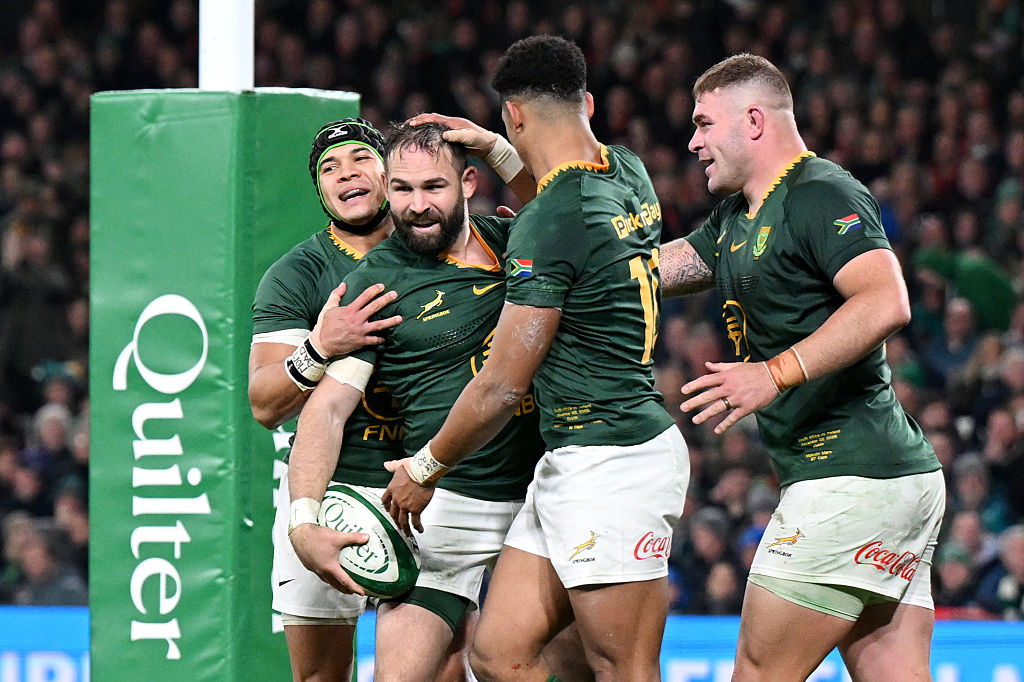
The Boks won by 11 points in Dublin, and the No 11 is often called a “master number” in numerology, and is thought to represent intuition, insight, and enlightenment. Add power and brutality and you have a summary of what happened at the Aviva Stadium against Ireland on Saturday night, writes Mark Keohane.
This was an assault.
If it was a boxing match, Ireland would have been counted out by the referee at halftime.
In rugby terms, this was not going to happen as the Irish spirits refused to yield to a knock out and the referee, deducting points throughout, refused to send Ireland to the corner on a TKO.
There can be no complaints in Dublin or anywhere in Ireland. The hosts were beaten up physically, lost by four tries to one, and should have finished the game in single player figures.
Ireland’s James Ryan should have had a straight red card and not the kindness of bunker review on his awfully malicious and cheap off the ball clenaout on the head of Boks hooker – and World Rugby Player of the Year – Malcolm Marx.
The record books will show the Irish got one bunker red and four yellow cards and the Boks got one. The Boks’ yellow card, in the 78th minute, was for celebrating a turnover. WTF!
It was an interesting call, to say the least, but the Boks refused to yield and kept Ireland scoreless in the last two minutes, when every call went Ireland’s way.
So much in Dublin has been made of Rassie Erasmus’s Golden Generation of Springboks never having won in Dublin between their RWC title wins in 2019 and 2023, which included a 2-1 home series win against the British & Irish Lions in 2021, with all three Tests played in Cape Town behind closed doors.
The Boks, back to back World Cup winners in 2019 and 2023, back to back Castle Rugby Championship winners in 2024 and 2025, Lions series winners in 2021, have also won in Italy, in Argentina, in Scotland, in Australia, in New Zealand, in Wales, in England at the Allianz in Twickenham, in Japan in the 2019 WRC and in France in the 2023 RWC.
The only country Erasmus’s boys had not won was in Dublin, courtesy of a three point defeat (19-16) in 2022.
Ireland, who have never advanced beyond a RWC quarter-final in 10 tournaments, held onto the Dublin win as justification as to why they should be considered the best team in the world.
That all ended on Saturday night and now Ireland’s claim to being the world’s best is to win the RWC, which would mean making history in going beyond the last eight in Australia in 2027.
Ireland has nothing left in bragging rights when it comes to the Boks, and they have a long wait until they meet the Boks in Dublin in November in 2026 in the inaugural Nations Championship.
For those South Africans working and living in Dublin, enjoy the next 12 months.
HOW KEO CALLED THE BOKS WIN ON AFRICA PICKS
The scoreline of 24-13 was kind to Ireland and the rugby gods were generous in allowing Ireland to leave the Aviva with scoreline respectability, even if the state of play should have read 30-plus points, and not the 11 differential.
The Irish were brave and they ripped up the law book to defend their try line. Their scrum was humiliated and on another night they may have ended up with no forwards on the field.
They will cry foul for the cards, but every single one was justified and there were more that should have gone against them.
They played for damage control and the Boks played to bury the hyped talked about ghosts of the Aviva.
The Boks won at the Aviva for the first time in 13 years, but it may be 13 years before Ireland ever threatens the Boks at the Aviva, such was the one-sided nature of the contest.
Ireland, when they review the match tape, will wonder how they did not concede 40-plus points, and the Boks, once the beers and brandy have settled, will wonder how they did not score 40-plus points.
For South Africa, the score will not matter, just the fact that Dublin was downed, not as smoothly as a Guinness, but with the brutality these boys put away a double brandy.
Boks by 10- plus 1.
KEO & ZELS INSISTED BOKS WOULD WIN IN SAYING RASSIE’S COWBOYS WOULD GUN DOWN IRELAND
READ SA RUGBY MAG DIGITAL FOR ALL REACTION TO THE BOKS 24-13 WIN v IRELAND IN DUBLIN
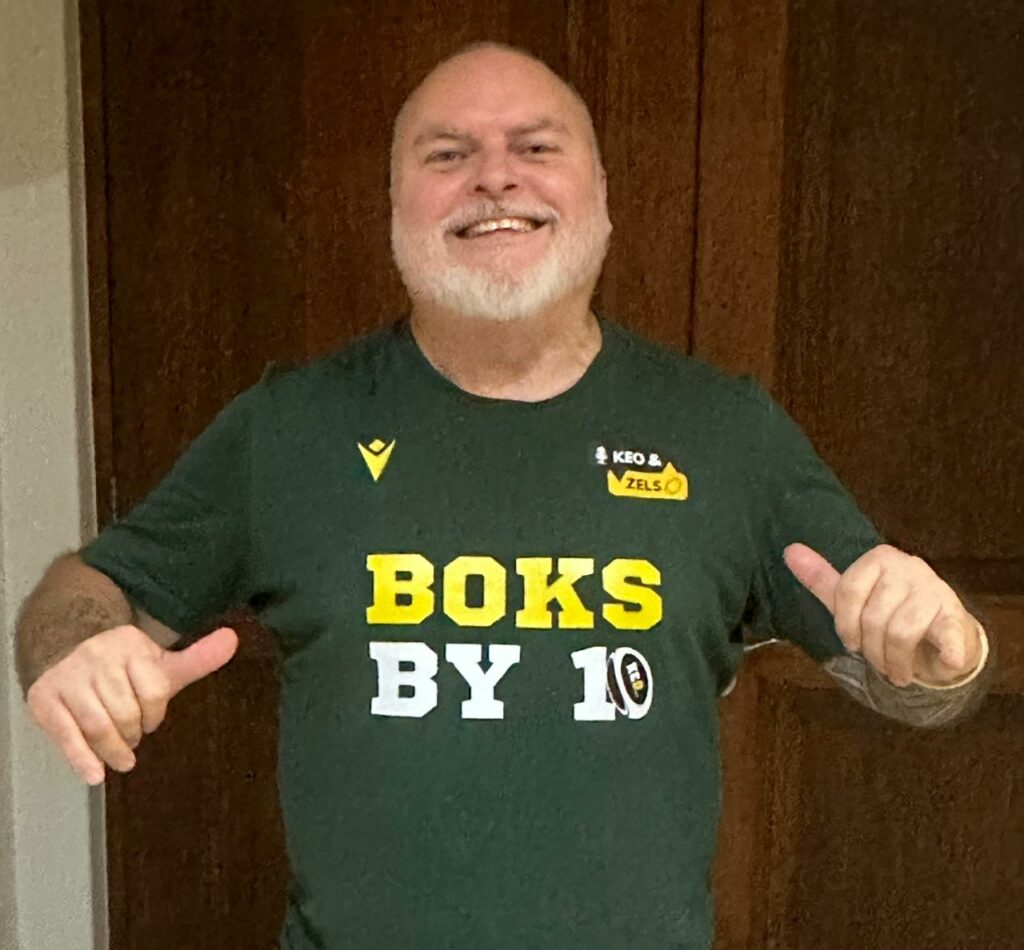
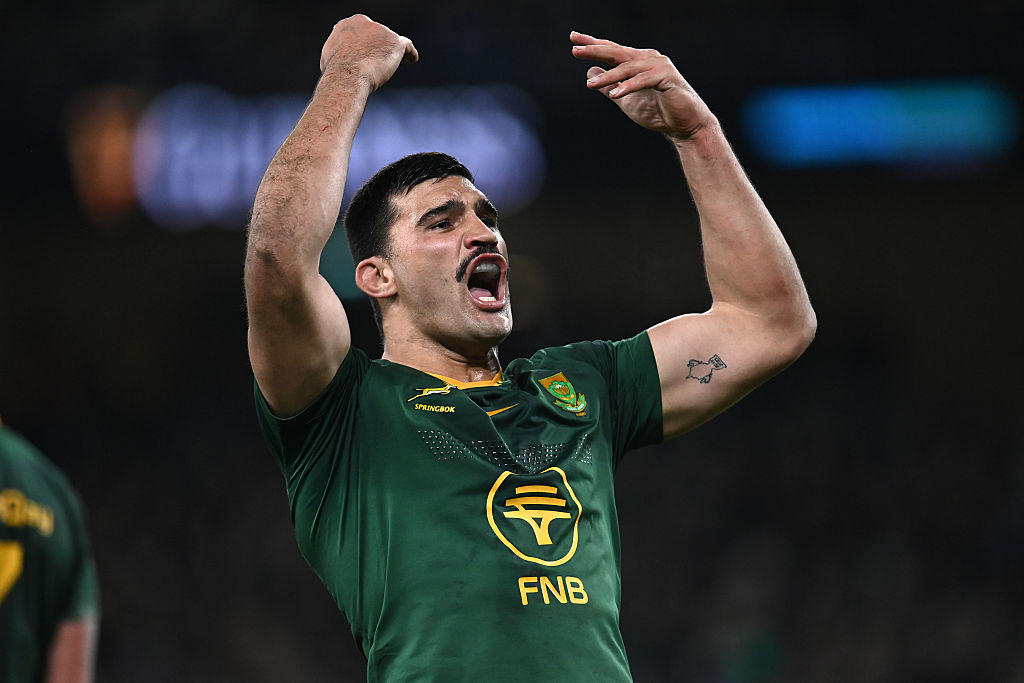
International Rugby
Why Sacha at No 10 is the key to finally breaking impressive Irish
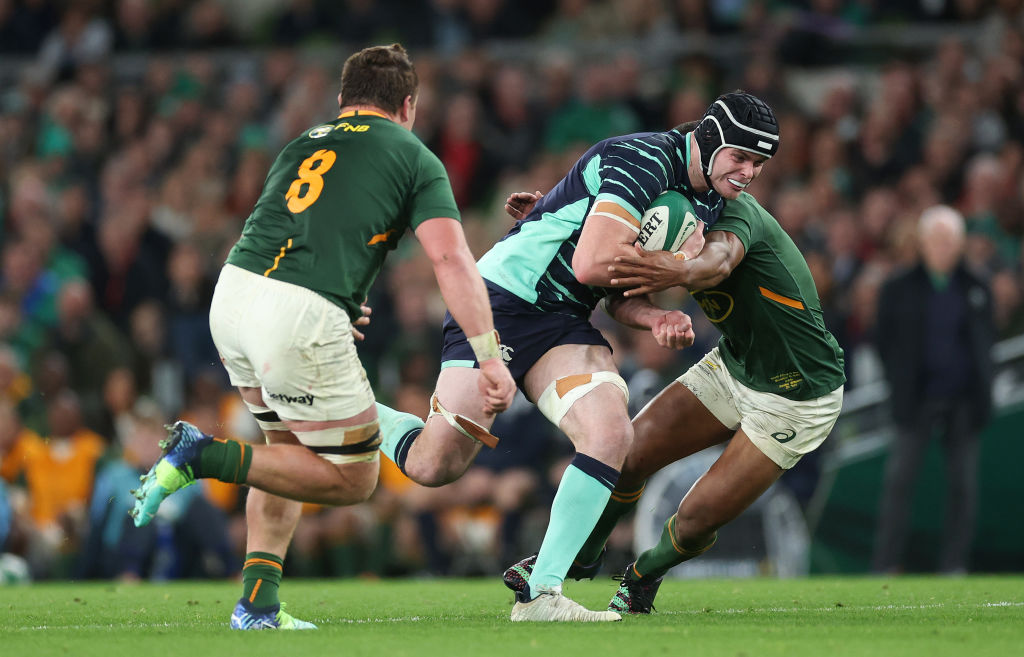
Sacha Feinberg-Mngomezulu is the playmaker the Springboks have not had at No 10 in their last four Tests against an Ireland team, who have found a way to win in three of those matches, writes Mark Keohane.
For all the dominance of the Springboks under Rassie Erasmus and for five of those years, from 2019 to 2023 Jacques Nienaber and Erasmus, Ireland is the one team that has matched the Boks minute for minute, try for try and big moment after big moment.
Respect is due to the Irish because they are the one side that has no inferiority complex when it comes to Erasmus’s all-conquering back to back World Cup winners and back to back Castle Rugby Championship winners.
Erasmus and Nienaber only played one Test against Ireland in Dublin since returning from Munster, Ireland to coach the Boks in 2018.
It was in 2022 and Ireland won 19-16.
A year later, at the Stade de France in Paris, Ireland won 13-8 and the teams drew a two-test series in South Africa in 2024, with the Boks winning 27-20 at Loftus Versfeld in Pretoria and losing with the final kick of the game 25-24 in Durban.
Those four Tests are the only historical relevance to Saturday’s match-up in Dublin because the core of the players remain from 2022, on both sides, as does the coaching leadership.
Erasmus, after the win in Pretoria, said the squad felt they had got ‘a monkey off our backs’ in beating Ireland, but Dublin, even though it has only been over one Test and 80 minutes in 2022, sits more like a Gorilla on the backs of the Boks than a Monkey.
Earlier this season the Boks stumbled at Eden Park in Auckland, losing 24-17 to the All Blacks, having found themselves 14-0 down within the opening 10 minutes. It was a massive disappointment for the squad as there was such belief they could be the history-makers to end the All Blacks unbeaten run at 50 Tests at Eden Park; a run that now sits at 52.
Dublin carries a similar kind of mission. Win there and then this squad, many of whom are into their eight International season together, would have conquered every team in their own respective backyards.
Ireland, who won 19 in succession at the Aviva Stadium before losing to the All Blacks in 2024, also got whipped by France in the Six Nations last season.
For the most the Aviva has proved a fortress and the respect of the occasion, from both sides, is emphasised by how little click bait headlines there has been in the build-up.
It has been the most dignified of days, with Erasmus heaping praise on Ireland and Irish coach Andy Farrell being as flattering of the Boks in response.
Players on both sides have said little and those who have spoken at media conferences have talked up the magnitude of the occasion and the virtues of their opposition.
The Boks, like Ireland, have said they have to be at their best to win.
Even the dark world of social media has been more an ocean of calm and reverence.
Ireland’s faithful can simply state three wins from four, one in Dublin, one in Paris and one in Durban when backing their side, while the Boks supporters comeback is to remind Irish fans of the 2023 World Cup, the 2019 World Cup, the 2007 World Cup and the 1995 World Cup, all won by the Springboks.
Statistically, half a point separates the two teams over the four Test matches, with Ireland’s 19.25 edging the Boks 18.75. In four matches, Ireland has scored 77 points to South Africa’s 75 and seven tries to six.
Feinberg-Mngomezulu was among the substitutes in Pretoria and Durban and if the Boks are to win in Dublin, he needs to be starting at No 10.
Pollard, who kicked eight penalties in Durban, also started at No 10 in Pretoria, while Damian Willemse started at No 10 in Dublin 2022 and Manie Libbok started at No 10 in Paris in 2023. In both those defeats, the missed penalties and conversions proved costly for the Boks.
Ireland have earned the right to be favourites in Dublin, even though the bookies have the Boks as favourites.
AFRICA PICKS: PREDICT THE SCORE IN DUBLIN AND WIN WITH THE BOKS
Springboks World Cup winners Willemse, Cheslin Kolbe, Jesse Kriel, Damian de Allende, Kurt-Lee Arendse, Pollard, Jasper Wiese, Pieter-Steph du Toit, Siya Kolisi, Kwagga Smith, Eben Etzebeth, RG Snyman, Franco Mostert, Malcolm Marx and Bongi Mbonambi have all been part of those match day squads who have come second in three of the four match-ups.
Those are some power names and among the best to have ever played for the Springboks. They are also among the best in the world.
There will be another opportunity in Dublin in 2026 when the Boks play a league match against Ireland in the inaugural Nations Championship, but for some of the big name veterans, this may be their last hurrah to get that elusive win in Dublin.
KEO & ZELS: RASSIE ON RED ALERT FOR DUBLIN DELIGHTS
SA RUGBY MAG: IRELAND HAVE THE BOKS NUMBER
Ireland 19 Springboks 16
Aviva Stadium, Dublin, 2022
Ireland held of a late charge by the Boks to underline their status as the No 1-ranked team in world rugby. In a tight game featuring two tries apiece, the Boks missed seven points off the kicking tee which proved crucial in the end.
Ireland: Keenan; Baloucoune, Ringrose, McCloskey, Hansen; Sexton (capt), Murray; Porter, Sheehan, Furlong, Beirne, Ryan; O’Mahony, Van der Flier, Doris. Subs: Herring, Healy, Bealham, Treadwell, Conan, Gibson-Park, Carbery, O’Brien.
South Africa: Kolbe; Arendse, Kriel, De Allende, Mapimpi; Willemse, Hendrikse; Kitshoff, Marx; Malherbe, Etzebeth, De Jager, Kolisi (capt), Du Toit, Wiese. Subs: Mbonambi, Nche, Koch, Mostert, Fourie, Smith, De Klerk, Le Roux.
Stade de France, Paris, 2023
A truly thunderous affair which lit the torch paper on the 2023 World Cup. The game was played before a crowd of over 78,000. It was epic. It was brutal. And it ended in a third consecutive win for the Irish over their southern hemisphere rivals. It was also Ireland’s 28th win out of their last 30 matches.
South Africa: Willemse; Arendse, Kriel, De Allende, Kolbe; Libbok, De Klerk; Kitshoff, Mbonambi, Malherbe, Etzebeth, Mostert, Kolisi (capt), Du Toit, Wiese. Subs: Fourie, Nche, Nyakane, Kleyn, Snyman, Van Staden, Smith, Reinach.
Ireland: Keenan; Hansen, Ringrose, Aki, Lowe; Sexton (capt), Gibson-Park; Porter, Kelleher, Furlong, Ryan, Beirne, O’Mahony, Van der Flier, Doris. Subs: Sheehan, Bealham, Kilcoyne, Henderson, Baird, Murray, Crowley, Henshaw.
Springboks 27 Ireland 20
Loftus Versveld, Pretoria, 2024
Part of an incoming two-Test tour, the Springboks managed to bag a first win against Ireland since 2016. Bok coach Rassie Erasmus admitted afterwards that it felt great to finally get the win as “they really had our number”. Still, it was a tight contest decided on a couple of marginal calls involving the TMO. The Boks showed early season rustiness against an Ireland team who a few months earlier had claimed another Six Nations crown but managed to hold out for an important victory.
South Africa: W le Roux; C Kolbe J Kriel, D de Allende KL Arendse; H Pollard, F de Klerk; O Nche, B Mbonambi, F Malherbe; E Etzebeth, F Mostert; S Kolisi (capt), PS du Toit, K Smith. Subs: M Marx, G Steenekamp, V Koch, S Moerat, RG Snyman, M van Staden, G Williams, S Feinberg-Mngomezulu.
Sin-bin: Arendse, 73
Ireland: J Osborne; C Nash, R Henshaw, B Aki, J Lowe; J Crowley, C Casey; A Porter, D Sheehan, T Furlong; T Beirne, J McCarthy; P O’Mahony (capt), J van der Flier, C Doris. Subs: R Kelleher, C Healy, F Bealham, J Ryan, R Baird, C Murray, C Frawley, G Ringrose.
Sin-bin: Kelleher, 78
Springboks 24 Ireland 25
King’s Park, Durban, 2024
An absolute humdinger which was decided by a last-minute drop goal by Ciaran Frawley. The win saw the series spoils shared and was a fitting way to celebrate Ireland coach Andy Farrell’s 50th match in charge. A flawless Handre Pollard slotted eight penalties to peg back Ireland, but two late Frawley drop goals proved decisive. The first one on 70 minutes got Ireland to within two, and then the final crushing blow right on the hooter to give Ireland another win in the latest instalment of an epic rivalry.
International Rugby
World Rugby ridiculed: Global reaction to Franco Mostert’s Red Card
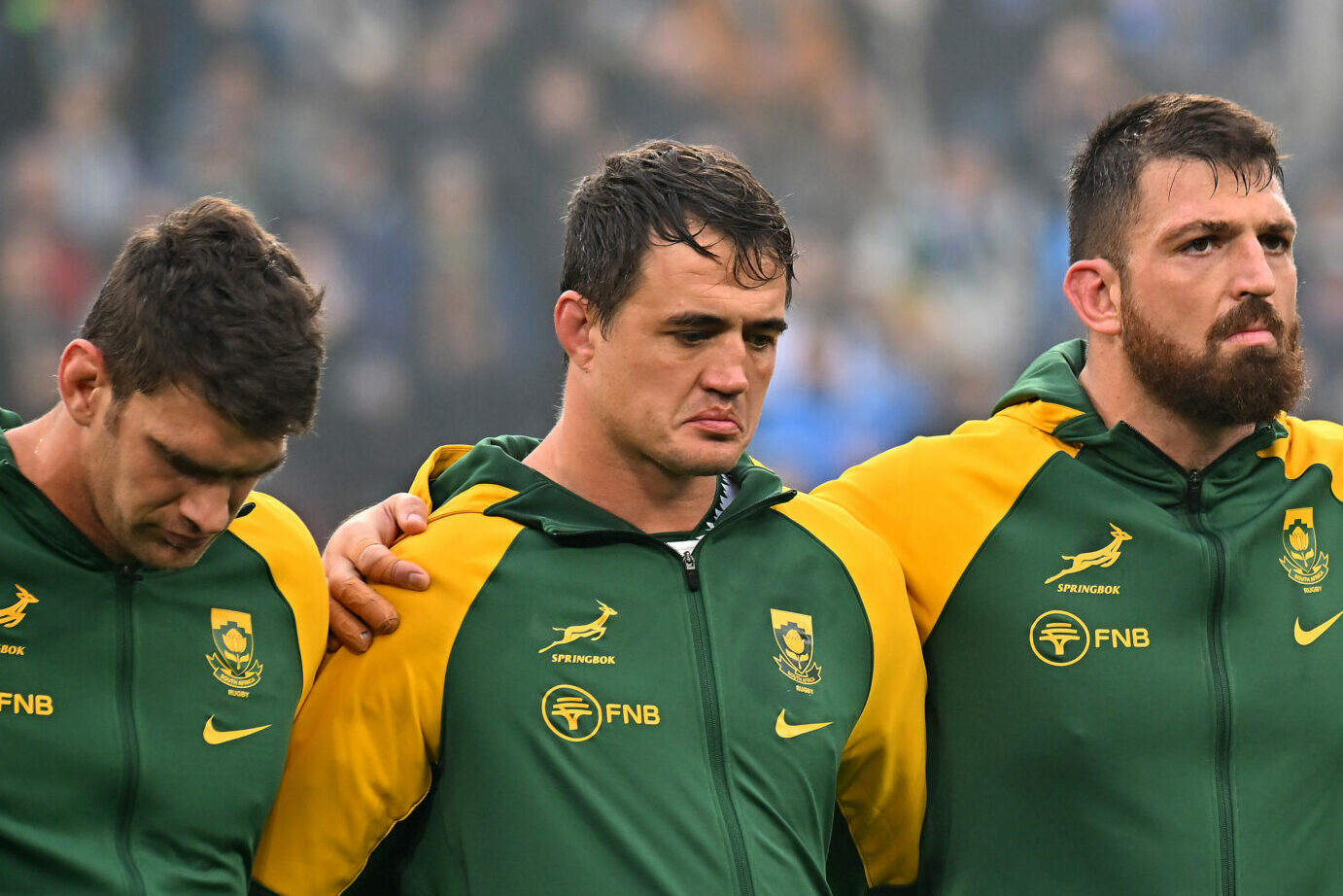
World Rugby has been ridiculed: From former Italian international lock Carlo del Fava to former All Blacks wing Jeff Wilson, to former England international Andy Goode, there has been ridicule at world rugby’s officials for the straight red card given to the Springboks lock Franco Mostert in Turin, Italy, writes Mark Keohane.
Mostert was shown a straight red card, as the second tackler, for what match officials deemed was an intentional shoulder to the head of Italian flyhalf Paolo Garbisi, who never went for an HIA and was up and running a few seconds after taking the tackle of Ethan Hooker and the secondary hit from Mostert.
Below is a collection of X feeds, which also showcased the inconsistency in all this weekend’s internationals when it came to shoulders to the head. In some instances, like James O’Connor taking one to the head in Dublin, it was play on. Others, like in Cardiff in Wales’s match against Japan, it was a yellow with a bunker referral to see if it was a red.
Same incidents, all different interpretations and applications.
World Rugby is a joke at the moment with its head contact policies that lack all consistency and all common sense.
If player welfare is indeed the reason, then why not send the victim of any head contact for an HIA?
Thomas Ramos, against the Boks last weekend, never went for an HIA and played the entire match. Garbisi never went for one in Turin and played the entire game.
It is a joke.
South Africans are justified in feeling aggrieved.
In my Sunday Times match review, I wrote that Justice, in the quality of the Springboks, triumphed over injustice, in the form of incompetent match officials, in Turin as the Springboks won for the 19th time in 20 Tests against Italy.
These Boks have a spirit that can’t be bought or manufactured. It is inherent because of an environment that has been nurtured over the past nine years.
Jared Wright posted this: Brilliant stat via @StatBoy_Steven
‘Since the introduction of the 20-minute red card, the Springboks have been given a full red card 3 times: July 12 vs Italy: Wiese in the 12th minute November 8 in France: Lood de Jager in the 40th minute November 15 in Italy: Franco Mostert in the 12th minute In 178 minutes combined in those matches after being shown the red card, they have conceded just 17 points and just 1 try, and won all 3.’
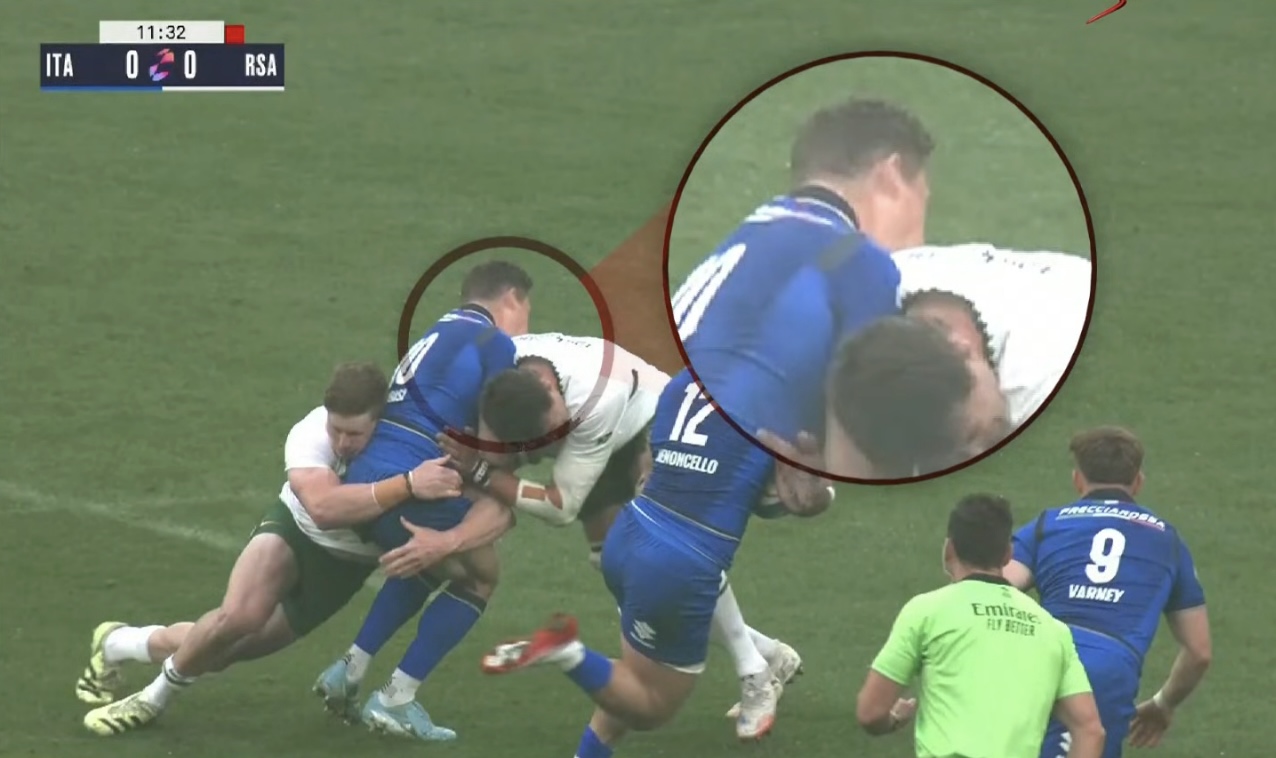
Screenshot
FRENCH V FIJI RED GOES UNPUNISHED
O’CONNOR GETTING SMASHED GOES UNPUNISHED
A COLLECTION OF INCONSISTENCIES FROM THE WEEKEND
WALES V JAPAN – ANOTHER INCONSISTENCY TO MOSTERT’S
WALES’S JOSH ADAMS INTENTIONAL THUGGERY GOES STRAIGHT TO BUNKER REVIEW
MARK KEOHANE ON BOKS 32-14 WIN v ITALY
Some X comments
https://x.com/AndyGoode10/status/1989727007467360333?s=20
https://x.com/PlanetRugby/status/1989701468635451731?s=20
https://x.com/SARugbymag/status/1990034224963854816?s=20
https://x.com/jaredwright17/status/1989700599630204977?s=20
https://x.com/SportyBetZA/status/1989747718961447247?s=20
https://x.com/SSRugby/status/1989681762075570494?s=20
https://x.com/mark_keohane/status/1989756004096168227?s=20
https://x.com/SSRugby/status/1989692773055041607?s=20
Photo: Alessandro Sabattini/Getty Images
International Rugby
Rassie Erasmus’s tactical genius inspires dogged Boks win
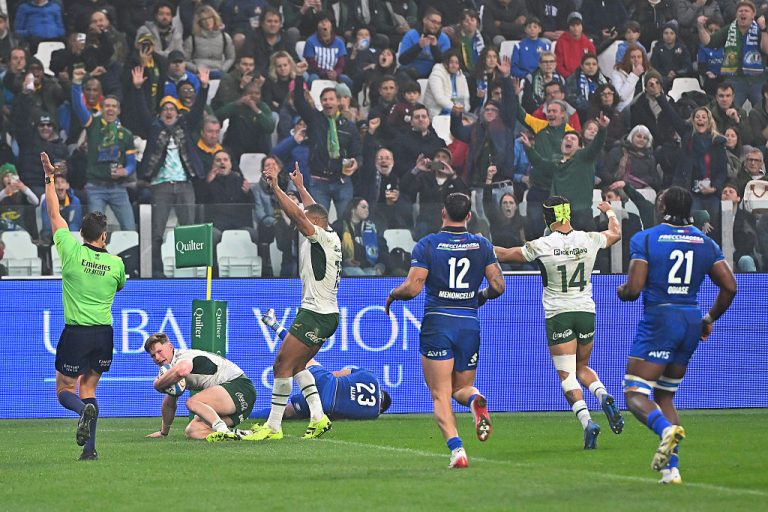
Rassie Erasmus gave a coaching tactical and substitution master class as the Springboks beat Italy in Turin, writes Mark Keohane.
What next for World Rugby and the Boks? 12 v 15?
The Boks were too strong for France in Paris, winning 32-17 despite playing for 30 minutes 14 versus 15.
In Turin, the Boks were down to 14 players after Franco Mostert’s straight red in the 11th minute.
It was a shocking call and for 10 minutes the Boks were 13-15 when Marco van Staden was sin-binned, but this was a win down to sheer heart, guts, determination from the players and Erasmus’s tactical appreciation of the match, his knowledge of his players and his understanding that change comes in the moment and not once the damage could be done, and then it being too late.
These Boks have ticker, but they also have a rugby genius at the helm, who is three moves ahead of the opposition.
Italy were brave and resolute. They were in the face of the Boks and physically they did not take a step back. They have improved immeasurably, but the reality is that for all the fire in their belly they are now three wins from 10 matches this season, including three successive defeats against the Boks in 2025.
There was the 42-24 reverse in Pretoria and week later they were done 45-0.
For 31 minutes there was no score in Turin, but what made that so significant is that Italy had so much of the ball, territory and a one-player advantage, but had nothing to show for it.
The Boks, showing their class, scored first through a Handre Pollard penalty after his successful drop goal was ruled out because of an earlier infringement and then Van Staden scored a game changing try on the 39th minute.
Given that the Boks entered the Italian 22 for the first time after 30 minutes, it was a massive moment in the match.
Italy, as they have done all season, did not go away, but they were just not good enough to handle 13 Boks, when gifted a two player advantage.
For the Boks, Damian Willemse was class at fullback and Kwagga Smith made the most impact off the bench.
Van Staden was everywhere and Ruan Nortje, off the bench early to give balance to the remaining players, just gets better at Test level and Grant Williams and Manie Libbok added the last quarter glitz to the first hour grind.
The Boks won under such adversity, which emphatically states their class as the sport’s No 1 team.
FOR ALL SPRINGBOKS REACTION, GO TO SA RUGBY MAGAZINE
HOW KEO AND ZELS CALLED THE BOKS WIN
International Rugby
The Sharks Ethan Hooker is STECO’S Man of the Moment
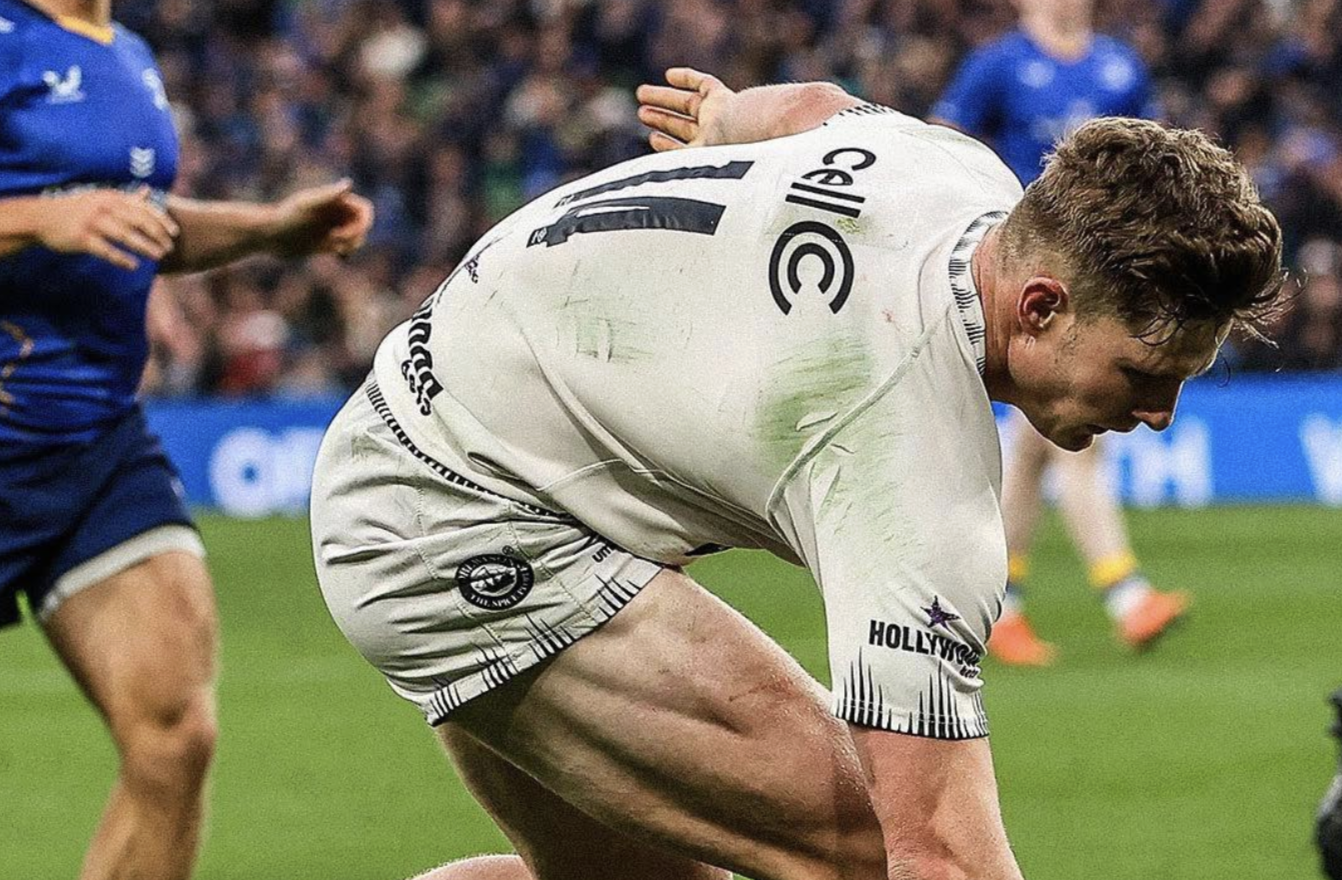
The Sharks winger Ethan Hooker is STECO’s Man of the Moment, according to Keo & Zels.
Each week Keo & Zels, on their Rugby Podcast, collaborate with STECO to bring you a moment that screams power, talks to the future and is about sustainability.
Hooker is all those things. He has been since making his professional debut two years ago as a 19 year-old and the Sharks and Boks winger, voted as the Players and Fans Player of the Year at the Sharks last season, has only got better in 2025.
Hooker was outstanding starting on the wing in the last three Tests of the Springboks victorious Castle Lager Rugby Championship campaign, and he went straight from being a title winner with the Boks to being the standout player in the Sharks 31-5 defeat against Leinster in Dublin.
Hooker is a beast, in size and potency, but he also has subtlety to his game and like all the best he has time when on the ball.
The intercept, the step and the acceleration too turn his calculated risk of using his eight to an advantage when going for the intercept, was special. To combine the necessary elements and execute it immediately was a summary of his all-round talent.
Hooker starts against Ulster in the Sharks first home match of the Vodacom United Rugby Championship, and expect him to have a ripper.
John Plumtree has named a star-studded Sharks starting XV with 13 Springboks, 2024 SA Junior Springbok of the Year Jurenzo Julius, and flyhalf Siya Masuku, who shone in the 2023-24 Challenge Cup, but that pedigree means nothing without performance: The Sharks, given the quality of a match 23 that has 17 internationals in the mix, should whip most teams playing at home in Durban.
TOASTING THE BOKS, BAFANA & THE PROTEAS
KEO CALLS THIS WEEKEND’S URC WINNERS ON AFRICA PICKS
Ethan Hooker brings his Springbok form to the #VURC 😤🦈
He gets the Sharks on the board 🔢
📺 Stream on DStv: https://t.co/0P0NNhnwKw pic.twitter.com/e8swBIMCcd
— SuperSport Rugby (@SSRugby) October 11, 2025
SHARKS AND BULLS MUST DELIVER STATEMENT WINS
Ethan Hooker’s brilliant try against Leinster is this week’s @STECO_Global PowerPlay of the week! pic.twitter.com/euOsGjReML
— SA Rugby magazine (@SARugbymag) October 13, 2025

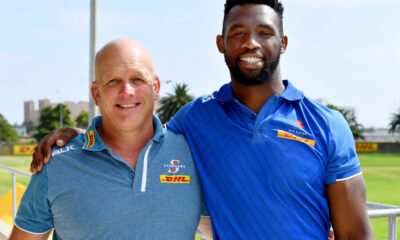

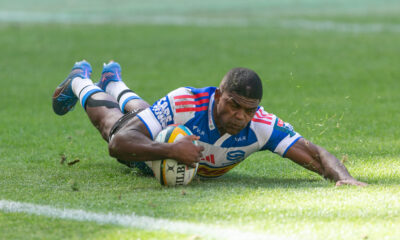

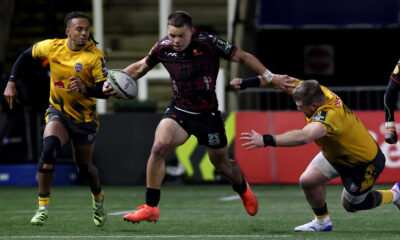

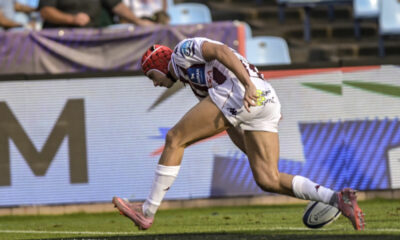

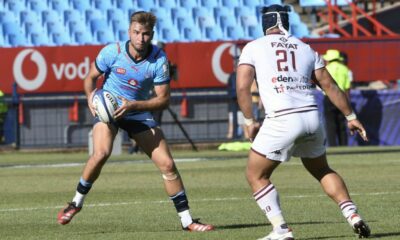

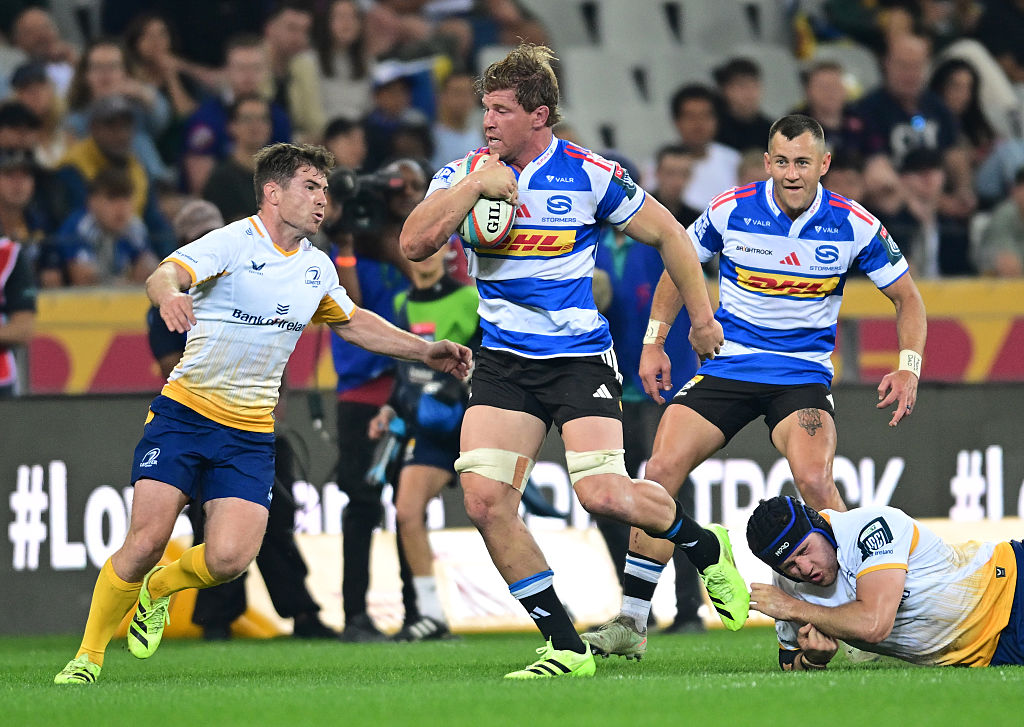
Njabulo Wela
21st August 2017 at 9:45 am
I agree somewhat, Keo, but let’s get through the Championship first before we start crowing. Things are looking better, though.
Keo
21st August 2017 at 9:56 am
Why do South Africans find it so hard to enjoy the moment and to celebrate in the now? In this moment there is reason to be smiling about the improvements all-round in our rugby, when compared to 2016.
Bear
21st August 2017 at 11:04 am
Probably because 2016 really was that bad. Once bitten, twice shy perhaps. Victories against France and Argentina were sweet though. Really want 2 wins against Australia. Even when down, those guys often seem to pick it up against SA.